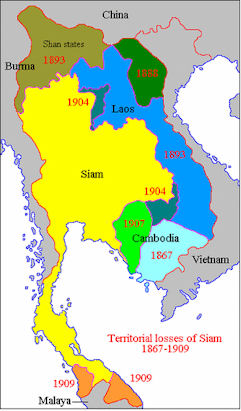

Zitierweise / cite as:
Payer, Alois <1944 - >: Chronik Thailands = กาลานุกรมสยามประเทศไทย. -- Chronik 1948 / B. E. 2491. -- Fassung vom 2017-03-23. -- URL: http://www.payer.de/thailandchronik/chronik1948.htm
Erstmals publiziert: 2013-04-27
Überarbeitungen: 2017-03-23 [Ergänzungen] ; 2016-12-17 [Ergänzungen] ; 2016-12-08 [Ergänzungen] ; 2016-10-31 [Ergänzungen] ; 2016-08-29 [Ergänzungen] ; 2016-04-30 [Ergänzungen] ; 2016-04-07 [Ergänzungen] ; 2016-03-24 [Ergänzungen] ; 2016-03-15 [Ergänzungen] ; 2016-01-29 [Ergänzungen] ; 2016-01-05 [Ergänzungen] ; 2015-10-02 [Ergänzungen] ; 2015-09-24 [Ergänzungen] ; 2015-08-20 [Ergänzungen] ; 2015-08-11 [Ergänzungen] ; 2015-07-10 [Ergänzungen] ; 2015-06-26 [Ergänzungen] ; 2015-06-07 [Ergänzungen] ; 2015-04-16 [Ergänzungen] ; 2015-04-06 [Ergänzungen] ; 2015-02-12 [Ergänzungen] ; 2014-12-31 [Ergänzungen] ; 2014-10-27 [Ergänzungen] ; 2014-08-25 [Ergänzungen] ; 2014-03-31 [Ergänzungen] ; 2014-02-17 [Ergänzungen] ; 2013-12-09 [Ergänzungen] ; 2013-12-02 [Ergänzungen] ; 2013-11-04 [Ergänzungen] ; 2013-10-26 [Ergänzungen] ; 2013-10-19 [Ergänzungen] ; 2013-10-07 [Ergänzungen] ; 2013-09-30 [Ergänzungen] ; 2013-06-12 [Ergänzungen] ; 2013-06-04 [Ergänzungen] ; 2013-05-29 [Ergänzungen] ; 2013-05-19 [Ergänzungen]
©opyright: Dieser Text steht der Allgemeinheit zur Verfügung. Eine Verwertung in Publikationen, die über übliche Zitate hinausgeht, bedarf der ausdrücklichen Genehmigung des Herausgebers.
Dieser Text ist Teil der Abteilung
Thailand von
Tüpfli's Global Village Library
ช้างตายทั้งตัวเอาใบบัวปิดไม่มิด
|
Gewidmet meiner lieben Frau Margarete Payer die seit unserem ersten Besuch in Thailand 1974 mit mir die Liebe zu den und die Sorge um die Bewohner Thailands teilt. |
|
Bei thailändischen Statistiken muss man mit allen Fehlerquellen rechnen, die in folgendem Werk beschrieben sind:
Die Statistikdiagramme geben also meistens eher qualitative als korrekte quantitative Beziehungen wieder.
|
1831 - 1948
Wasserzustände in Zentralthailand
Abb.: Wasserzustände in Zentralthailand 1831 - 1948 (117 Jahre) (in Jahren)
[Datenquelle: Feeny, David <1948 - >: The political economy of productivity : Thai agricultural development 1880 - 1975. -- Vancouver : University of British Columbia Press, 1982. -- (Asian studies monographs ; 3). -- Zugl.: Diss. Univ. of Wisconsin-Madison. -- 238 S. ; 24 cm. -- S. 60]
1911 - 1948
Mit anderen Pflanzen als Reis kultivierte Flächen (in 1000 Rai - ไร่):
Mit anderen Pflanzen als Reis kultivierte Flächen (in 1000 Rai - ไร่; 1 Rai = 1600 m²), 1911 - 1948
[Datenquelle: Ingram (1971), S. 51]
Abb.: Baumwolle und Reis, Nordostthailand, 2010
[Bildquelle: Wayne Surber. -- http://www.flickr.com/photos/emptyhighway/4500326436/. -- Zugriff am 2012-01-25. -- Creative Commons Lizenz (Namensnennung, keine kommerzielle Nutzung, keine Bearbeitung)]
1948
Kosten landwirtschaftlicher Geräte
Kosten landwirtschaftlicher Geräte 1948 (in Baht)
Kosten landwirtschaftlicher Geräte 1948 in Prozent des Werts der durchschnittlichen Jahresernte an Reis
[Datenquelle für beide Diagramme: Feeny, David <1948 - >: The political economy of productivity : Thai agricultural development 1880 - 1975. -- Vancouver : University of British Columbia Press, 1982. -- (Asian studies monographs ; 3). -- Zugl.: Diss. Univ. of Wisconsin-Madison. -- S. 41]
1897 - 1975
Güter- und Personenbeförderung durch Eisenbahn:
Abb.: Güterbeförderung durch Eisenbahn (in Mio. Tonnen), 1897 - 1975
[Datenquelle: Mitchell (1982), S. 519, 523, 527]
Abb.: Güterzug bei Lopburi (ลพบุรี), 2011
[Bildquelle: Tetsusi Kimura. -- http://www.flickr.com/photos/kimtetsu/5666658862/. -- Zugriff am 2012-01-30. -- Creative Commons Lizenz (Namensnennung, keine kommerzielle Nutzung, share alike)]
Abb.: Lage von Lopburi (ลพบุรี)
[Bildquelle: OpenStreetMap. -- Creative Commons Lizenz (Namensnennung, share alike)]
Abb.: Personenbeförderung durch Eisenbahn (in Mio. Passagieren und Mio. Passagier-Kilometern), 1897 - 1975
[Datenquelle: Mitchell (1982), S. 519, 523, 527]
Abb.: Personenzug, 2008
[Bildquelle: Kristijan Brkic. -- http://www.flickr.com/photos/brka/2744358757/. -- Zugriff am 2012-01-30. -- Creative Commons Lizenz (Namensnennung, keine kommerzielle Nutzung)]
1948 - 1950
Durchschnittliche jährliche staatliche Subvention für Sachaufwand (inkl. Schulbücher, Schreibmaterial, Medizin, Reparaturen) pro Schule:
1948: 82 Baht
1950: 265 Baht
1948
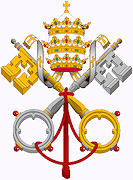

Missionsschulen werden als öffentliche Institutionen (public institutions) klassifiziert und genießen Steuerfreihheit.
1948
Es gibt 1583 Privatschulen, Betreiber davon sind Staatsbürger von
USA: 18
Großbritannien: 2
Frankreich: 15
Italien: 4
Tschechoslowakei: 2
Spanien: 1
Chinesen: 327
1948
Kommunistenjagd:
"Reinigung" der Behörden von "Kommunisten". Aufruf zur Denunziation von Kollegen. Staatsbedienstete dürfen keine "kommunistischen" Zeitungen lesen.
Die Regierung produziert angebliche Flugblätter der Communist Party of Thailand - CPT (พรรคคอมมิวนิสต์แห่งประเทศไทย - พคท), in denen der Buddhismus und die Monarchie angegriffen werden und Terrorakte angekündigt werden. So soll die Bevölkerung gegen "Kommunisten" aufgehetzt werdsen.
1948
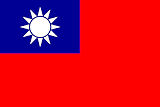
Obwohl die Botschaft der Republik China versucht, den Einfluss der Linken in der Chinese Chamber of Commerce zurückzudrängen, werden in den Vorstand der Chamber gewählt u.a.
- 1 Kommunist
- mehrere Mitglieder der China Democratic League (中國民主同盟)
- sonstige vom Kuomintang (中國國民黨) unabhängige
1948
Über 200 chinesische Kurzwaren-Geschäfte gründen die Importgesellschaft Yu-yi Association.
1948
Staatliche Gründung des gewählten Student Committee (คณะกรรมการนักศึกษา) der Thammasat University (มหาวิทยาลัยธรรมศาสตร์). Es besteht bis 1958.
1948
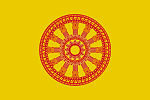
Gründung der Lehrerbildungsanstalt für Mönche im Wat Sam Phraya in Bangkok ( สำนักอบรมครูวัดสามพระยา). Schon 1948 nehmen 1000 Mönche aus ganz Siam an einem 40tägigen Fortbildungskurs teil.
Abb.: Lage von Wat Sam Phraya (วัดสามพระยา)
1948

Es erscheint die Zeitschriftหลักบริหาร [Grundsätze der Verwaltung]
"Die direkten und indirekten Versuche des Thammayutika-Nikaya [ธรรมยุติกนิกาย], das Ordensgesetz von 1941 [พระราชบัญญัติคณะสงฆ์ พุทธศักราช ๒๔๘๔] unwirksam zu machen, waren auf der anderen Seite begleitet von einer teils heftigen Politik des Mahanikaya [มหานิกาย] gegen den Thammayutika-Nikaya. Eine Hochburg dieser Polemik war das schon mehrfach genannte Kloster Wat Sam Phraya [วัดสามพระยา], dessen Abt Phra Poriyat Sophon [พระปริยัติโสภณ] zu den Verehrern von Phibun Songkhram zählte. Schon vor 1944 und wieder nach der Machtübernahme im Spätjahr 1947 war Feldmarschall Phibun Songkhram als Premierminister ein häufig gesehener Gast. Nach 1947 konnte die hier ansässige Mönchsgruppe in der Zeitschrift "Lak Borihan" [หลักบริหาร] (Grundlagen der Verwaltung) mit beträchtlicher Schärfe, den Thammayutika-Nikaya angreifen. Einer der schärferen Beiträge stammt aus der Feder des Abtes selbst. Er trägt den Titel "Über den Mechanismus der Ordensverwaltung", war ursprünglich als Sondervortrag in der dem Kloster angeschlossenen buddhistischen Lehrer-Bildungsanstalt gehalten und später in der genannten Zeitschrift veröffentlicht worden. Erneut liest man hier die Kritik an der Gründung des Thammayutika-Nikaya durch den Prinzen Mongkut [มงกุฎ, 1804 - 1868] während der Regierungsperiode von Rama III. Weiterhin wird dem Thammayutika-Nikaya seine Überheblichkeit angekreidet. Schließlich werden die Ungerechtigkeiten im Ordensgesetz von 1902 [พระราชบัญญัติ. ลักษณะปกครองคณะสงฆ์ ร.ศ.๑๒๑] unterstrichen, die durch das neue Gesetz von 1941 beseitigt worden seien. Dennoch habe der Thammayutika-Nikaya seine Strategie, lediglich den eigenen Vorteil zu suchen, nicht aufgegeben. Deshalb stünden die Absichten des Ordensgesetzes nur auf dem Papier und könnten nicht in die Tat umgesetzt werden. Der Thammayutika-Nikaya versuche, den Mahanikaya zu paralysieren und in das Stadium des Verfalls zu bringen, anstatt das gemeinsame Wohl des Buddhismus und der gesamten Nation im Auge zu behalten. All diese Mängel und Fehler wären nicht entstanden, wenn der buddhistische Orden nicht in zwei Nikayas gespalten worden wäre." [Quelle: Skrobanek, Walter <1941 - 2006>: Buddhistische Politik in Thailand : mit besonderer Berücksichtigung des heterodoxen Messianismus. -- Wiesbaden : Steiner, 1976. -- 315 S. ; 24 cm. -- (Beiträge zur Südasienforschung ; 23). -- ISBN 3-515-02390-9. -- Zugl.: Heidelberg, Univ., Diss., 1972. -- S. 71 - 73. -- Mit Erlaubnis des inzwischen verstorbenen Autors]
1948

Mönchs-Schüler von Buddhadasa Bhikkhu (พุทธทาสภิกขุ, 1906 - 1953) beleben neu das verlassene, etwa 700 Jahre alte, Wat Umong (วัดอุโมงค์) in Chiang Mai (เชียงใหม่).
Abb.: Wat Umong (วัดอุโมงค์) in Chiang Mai (เชียงใหม่), 2013
[Bildquelle: Mr & Mrs Backpacker. -- https://www.flickr.com/photos/mrandmrsbackpacker/11849377084/. -- Zugriff am 2015-04-16. -- Creative Commons Lizenz (Namensnennung, keine kommerzielel Nutzung)]
Abb.: Moderne Wandmalerei, Wat Umong (วัดอุโมงค์) in Chiang Mai (เชียงใหม่), 2013
[Bildquelel: Sarah Karlson. -- https://www.flickr.com/photos/naohai/8510892791. -- Zugriff am 2015-04-16. -- Creative Commons Lizenz (Namensnennung, keine kommerzielle Nutzung)]
Abb.: Lage von Wat Umong (วัดอุโมงค์)
[Bildquelle: OpenStreetMap. -- Creative Commons Lizenz (Namensnennung, share alike)]
1948
Abb.: Werbung, 1948
[Fair use]
1948
Srikrung Daily News (ศรีกรุง), Titelblätter:
Abb.: Srikrung Daily News (ศรีกรุง),
Titelblätter, 1948
[Fair use]
1948
Gründung der Army Reserve Force Students (นักศึกษาวิชาทหาร).
Abb.: ®Logo
"Army Reserve Force Students (Thai: นักศึกษาวิชาทหาร; RTGS: nak suek sa wicha thahan) are a military youth organization in Thailand under control of the Royal Thai Army (กองทัพบกไทย). History
Prior to World War II the Yuwachon Thahan (or "junior soldiers", Thai: ยุวชนทหาร) were established in 1934 by Field Marshal Luang Pibulsonggram (แปลก พิบูลสงคราม, 1897 - 1964). At the beginning of World War II junior soldiers were sent to fight troops of the Japanese Empire that invaded southern Thailand on 8 December 1941.
At the end of the war the junior soldiers were disbanded, but Lieutenant General Luang Chatnakrop (พล.ท. หลวงชาตินักรบ) created the Army Reserve Force Students to replace them in 1948. Today most students who participate in the reserve do so to avoid the chances of being drafted into the full-fledged military force for about three years. Because of this, the requirements for admission has risen recently.
RequirementsThe current requirements are:
- Thai nationality
- Age of younger than 22 years
- Must be approved by their parents or guardians
- A grade-point average of above 2.50 or certificate of passing senior scout
- A doctor's certificate of health. People with disabilities, fatal sickness, disease or extreme eye problems such as color blind are not allowed.
- Body mass index of less than 30 (obesity)
- Must have appropriate body height and size according to age
- Fitness test of a 1000 meter run in 3:15, 34 sit-ups in two minutes, and 22 push-ups in two minutes are also required (each test has score of 100 on its own, giving 300 in total) is also required and will be taken at the Territorial Defense School itself. Female applicants have more relaxed requirements.
- Male Students are also required to cut their hair so that the white of their scalp is visible on 3-sides, and a small patch of hair is visible on the top-most of the head. It is in fact, very similar to a Crew cut
Applicants who do not meet fitness test requirements are graded by their score, which measured their performance during the test. Applicants with higher score will have priority. Some other applicants who do not meet other criteria may be accepted in a case-by-case basis. If extra funding is available, more applicants will be accepted.
After these tests are completed, the ones that are chosen are given a beret in their succession.
Then they are sent to the shooting range where they are briefly taught about a rifle, the rifle in use here is the HK33, M16
In Chiang Mai (เชียงใหม่), International school students are however trained at different sites, usually not at the main Territorial Defense School.
StudyArmy Reserve Force Students have to study 20 weeks per year and a period of field training, but only common for grade 2 through grade 5 students. The students must be present for 100% and are not allowed to skip any exams. By the end of every semester Army Reserve Force Students have to pass an exam to continue their study into the next grade.
Army Reserve Force Students have to test:
- Marksmanship test using a rifle, where amount and intensity of test depends on their grade
- Written test of 120 multiple-choice questions
- Physical test covering procedures, use of tools, and discipline learned during the year
Army Reserve Force Students have 5 grades:
- Students who complete grade 1 are equivalent to Private First Class and will halve their service period as a conscript.
- Students who complete grade 2 are equivalent to Corporal and their service period will be only a quarter than that of a non-military student.
- Students who complete grade 3 may request for permission to use the title Sergeant, and are completely exempt from conscription.
- Students who complete grade 4 are equivalent to Master Sergeant
- Students who complete grade 5 and their B.D. may ask for the title Acting Second Lieutenant. Also, on the graduation from their university, they are allowed to dress in white officer's uniform and wear a sword.
Field training lengths (dependent on grade and gender of the student):
Uniform and Insignia
- Grade 2 Male, at least 3 days
- Grade 3 Male, at least 5 days
- Grade 4,5 Male, at least 7 days
- Grade 2,3 Female, at least 3 days
- Grade 4,5 Female, at least 5 days
Army Reserve Force Students wear a khaki-green uniform and beret with Army Reserve Command insignia (Cross swords under The great crown of victory) on their collar beret and belt. Army Reserve Force Students distinguish their school and province by school's coat of arms on the right shoulder, and province badge on left chest.
Special trainingAbout 200 4th grade Army Reserve Force Students who pass the physical test will be allowed to enter the parasail training course. This course is currently conduct annually.The physical requirement is 1 miles running - under 7.45 minutes. Push-up 50 in 2 minute. Sit-Up 100 in two minutes. Pull-Up 20 times without times."
[Quelle: http://en.wikipedia.org/wiki/Army_Reserve_Force_Students. -- Zugriff am 2012-10-10]
1948
Es erscheint
Chen Duriyanga [พระเจนดุริยางค์ = Peter Feit] <1883 - 1963>: Siamese music in theory and practice as compared with that of the West and a description of the piphat band. -- Bangkok : Department of Fine Arts, 2491 [= 1948]. -- 30 S. : Ill. ; 26 cm.
Abb.: Einbandtitel
1948
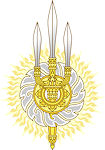

Komposition König Bhumibols 1948:
- March Rajaval (Royal Guards March) - มาร์ชราชวัลลภ: für das First Infantry Regiment King's Own Bodyguard (กรมทหารราบที่ 1 มหาดเล็กรักษาพระองค์)
- Thai Text von Major Sripo Tosnud (พันตรี ศรีโพธิ์ ทศนุต)
Abb.: First Infantry Regiment King's Own Bodyguard (กรมทหารราบที่ 1 มหาดเล็กรักษาพระองค์), 2012
[Bildquelle: Xiengyod / Wikimedia. -- Creative Commons Lizenz (Namensnennung, share alike)]
1948


Gründung der British Army Jungle Warfare Training School in Kota Tinggi (Malaya). Sie besteht dort bis 1971 und wird dann nach Brunei verlegt.
Abb.: Lage von Kota Tinggi
[Bildquelle: OpenStreetMap. -- Creative Commons Lizenz (Namensnennung, share alike)]
1948

Die US-Mikrobiologin Elizabeth Lee Hazen (1885 - 1975) und dei US-Chemikerin Rachel Fuller Brown (1898 - 1980) isolieren als erstes Antimykotikum (gegen Pilzerkrankungen) Nystatin aus Streptomyces noursei.
Abb.: Elizabeth Lee Hazen (1888-1975) und Rachel Brown (1898-1980), 1955
[Bildquelle: Acc. 90-105 - Science Service, Records, 1920s-1970s, Smithsonian Institution Archives. -- https://www.flickr.com/photos/25053835@N03/5493818989. -- Zugriff am 2016-04-23. -- Keine bekannten Urheberrechtseinschränkungen]
"Nystatin wurde 1948 als erstes Antimykotikum isoliert aus Streptomyces noursei von Elizabeth Lee Hazen und Rachel Fuller Brown am New York State Department of Health. Der Streptomyces-Stamm, aus dem sie Nystatin isolierten, war aus dem Gartenboden von Freunden mit dem Namen Nourse und wurde somit noursei genannt. Hazen und Brown benannten Nystatin 1954 nach dem New York State Department of Health." [Quelle: https://de.wikipedia.org/wiki/Nystatin. -- Zugriff am 2014-04-23]
1948

US-Flugzeuge haben erstmals Wetter-Radar an Bord.
Abb.: Wetterradar Südthailand, 2013-09-30 8:00
1948-01


Der Pridi-Anhänger Supha Sirimanond (สุภา ศิริมานนท์, 1914 - 1986), bis 1947-11 Diplomat in der Schweiz, dann willkürlich nach Frankreich versetzt, wird nach Thailand abberufen. Er wird im Mai polizeilich zum Tod Rama VIII. (1946-07-09) verhört. Die Presse bezeichnet ihn immer wieder als Handlanger Pridis, der in die Schweiz geschickt worden sei, um König Bhumibol zu schaden.
Abb.: Einbandtitel einer Zeitschrift über Supha Sirimanond (สุภา ศิริมานนท์)
[Fair use]
1948-01-04 4:20

Burma wird unabhängiger Staat. Erster Ministerpräsident wird U Nu (ဦးနု, 1907 - 1995). Der Zeitpunkt der Unabhängigkeit wurde von Astrologen bestimmt.
Abb.: Burma
[Bildquelle: CIA. -- Public domain]
Abb.: U Nu (ဦးနု) (links) mit Mahatma Gandhi (મોહનદાસ કરમચંદ ગાંધી), 1947
[Bildquelle: Wikimedia. -- Public domain]


Den während des Kriegs aus Burma nach East Bengal geflohenen 80.000 Muslimen wird die Rückkehr nach Burma verweigert. Die Muslime waren geflohen, weil Buddhisten mit Unterstützung Japans Grausamkeiten an Muslimen verübten, um diese für ihre Loyalität zu den Briten zu bestrafen.
1948-01-17

Die Kontrolle über das Crown Property Bureau (สำนักงานทรัพย์สินส่วนพระมหากษัตริย์) und die Privy Purse des Königshauses werden von der Aufsicht des Finanzministeriums unter die Aufsicht eines vom König nominierten Aufsichtsorgans übertragen. Die Erträge der Privy Purse (พระคลังข้างที่) stehen ab jetzt der königlichen Familie zu.
Webpräsenz: http://www.crownproperty.or.th/en/main.php. -- Zugriff am 2011-10-08
Abb.: Lage des Crown Property Bureau (สำนักงานทรัพย์สินส่วนพระมหากษัตริย์)
[Bildquelle: OpenStreetMap. -- Creative Commons Lizenz (Namensnennung, share alike)]
"Das Bureau of the Crown Property oder, wie es häufiger genannt wird, Crown Property Bureau, kurz CPB, Thai: สำนักงานทรัพย์สินส่วนพระมหากษัตริย์) ist eine Regierungsbehörde in Thailand, die für die Vermögensverwaltung des thailändischen Königshauses verantwortlich ist. Es ist per Gesetz von Steuern befreit. Im Jahre 2004 hatte das CPB über fünf Milliarden Baht an Einnahmen zu verzeichnen. Der Jahresbericht wird nur dem König vorgelegt. Das Crown Property Bureau wird von Chaovana Nasylvanta geleitet.
BeteiligungenSeit den 1970er Jahren ist das Crown Property Bureau an vielen thailändischen Unternehmen beteiligt. Unter anderem ist es Hauptaktionär von Siam Cement, Christiani & Nielsen, Deves Insurance und Siam Commercial Bank.
Daneben hält es Beteiligungen an etlichen weiteren einheimischen Unternehmen, von denen viele im SET Index an der Börse in Bangkok gelistet sind.
Außerdem besitzt das Crown Property Bureau 36.000 Grundstücke in Bangkok mit einer Gesamtfläche von 54 km² und etliche außerhalb Bangkoks auf einer Gesamtfläche von 160 km². Diese werden vermietet oder verpachtet. Dazu gehören viele Grundstücke in den besten Lagen Bangkoks. Das CPB ist damit der größte Vermieter in Bangkok.
Des Weiteren hält das CPB mehrheitlich Anteile an der Kempinski Hotel AG mit Hauptsitz in München und deren Tochter Kempinski S.A. mit Hauptsitz in Genf. [1]
Der Gesamtwert des Vermögens wird nicht veröffentlicht, von außenstehenden Beobachtern aber auf etwa zwei bis acht Milliarden US-Dollar geschätzt."
[Quelle: http://de.wikipedia.org/wiki/Crown_Property_Bureau. -- Zugriff am 2011-10-08]
"The Crown Property Bureau (Thai: สำนักงานทรัพย์สินส่วนพระมหากษัตริย์) Background
The Crown Property Bureau was established under the Royal Assets Structuring Act of 1936 and became a juristic person in 1948. According to the Act, a Crown Property Board was set up, to be chaired ex officio by the Finance Minister, and served by at least four royally-appointed directors. His Majesty the King would also name one of the board members the director-general of the Crown Property Bureau. The Board of Crown Property is responsible for the overall supervision of the activities of the Crown Property Bureau. Duties and responsibilities of the director-general are prescribed by the Board of Crown Property.
Initially, the Crown Property Bureau was under the jurisdiction of the Royal Treasury of the Royal Household Bureau. On 21 April 1935, the 1934 act to exempt royal assets from taxation took effect. The act categorized the royal assets into two types:
- Assets eligible for tax exemption
- Assets eligible for tax payment
On 19 July 1937, the Royal Assets Structuring Act of 1936 became effective. It separated the royal assets into “His Majesty’s personal assets”, “crown property” and “public property”. “His Majesty’s personal assets” would be managed by the Finance Ministry. The Crown Property Bureau was set up with the status equivalent to a division under the Treasury Department of the Finance Ministry. Some of the functions, responsibilities and officials were transferred from the Office of the Privy Purse to the Crown Property Bureau which sought permission to locate its office on the premises of the Office of the Privy Purse in the grounds of the Grand Palace.
The Royal Assets Structuring Act has been amended twice: the second amendment (1941) was promulgated on 7 October 1941 and the third amendment (1948) was promulgated on 18 February 1948. The Crown Property Bureau’s status was then elevated to a juristic person responsible for supervising, preserving and managing the crown property. The director-general of the Crown Property Bureau is authorized to affix his signature on behalf of the Crown Property Bureau. The Crown Property Bureau has moved its office four times. The Ladawan Palace, commonly referred to as the “Red Palace” has been home to the Crown Property Bureau since 18 July 1946. Every 18th day of February is regarded as the anniversary of the Crown Property Bureau’s establishment.
MissionThe Crown Property Bureau is responsible for protecting and managing the royal assets and property as well as supporting other activities for the benefit of Thai subjects and society.
Policy Thrust and PeopleThe CPB is one of organization that has been focused on personnel development for its organizational strength. For an organization to survive and be successful it requires a highly motivated, dedicated and professional team to adapt in changing environment . As a result, the CPB realizes that its personnel must remain fully alert about changes in conditions that occur in their fields of responsibility. Moreover, the CPB seeks to establish a 'learning organization' atmosphere that will set a standard of excellence for the CPB under both national and international media attention, it causes its staffs become more aware about the social implications of their actions.
Real Estate ManagementTo meet the tenants’ satisfaction the CPB has been improved service for all tenants. The CPB has been renewed lease contract for its tenants every three years for rent rationalization and planned for site development which will be consistent with long-term town planning considerations. Moreover, the CPB has a measurement to assist tenants those who affected by floods and political unrest by rental fee reduction.
Sustainable DevelopmentThe CPB has chosen to make long-term investment in selected core business institutions such as the Siam Cement Group (SCG), the largest Thai industrial conglomerate and the Siam Commercial Bank (SCB), Thailand's first commercial bank. Both the SCB and the SCG adhered to the policy of focusing on core businesses that offer security, effective operations, sound risk management and transparency as well as responsibility towards their employees, the public, society and the environment in accordance with good corporate governance and corporate social responsibility (CSR)practices.
DIVERSE CSR ACTIVITIESThe CPB has been able to expand its diversified social projects such as temple restorations, rice research and development with the Rice Department of the Ministry of Agriculture and Cooperatives. Within this diversity, the "youth development" is promoted with CPB allies at the SCB and the SCG. The projects have been aimed at supporting the Ministry of Education for inculcating His Majesty the King's Sufficiency Economy Philosophy in the Thai school system, the establishment of the Nitasrattanakosin Exhibition Hall on Ratchadamnoen Road for Thai youngsters to learn, appreciate and take pride in Thailand's artistic and cultural legacies of the Rattanakosin Era. Besides, the CPB has been supported numerous other projects such as scholarships contributing for Thai youths. the CPB looks forward to further expanding its role in this regard as well as improving its effectiveness in selecting and carrying out these social projects with its partners and allies.[1].[1]
Community Developmentthe CPB accepted that sustaining community improvements required partnership and cooperation among many parties. Most of all it requires empowerment of the community leaders and volunteers to help solve their own problems such as drug abuse and exploitative tendencies by some community members. Community empowerment is key function of the CPB to enhanced physical well-being, better life security and happiness in community of its land .[2][2]
Conservation of Heritage Buildings and Sitesthe CPB has been realized on the "Heritage Buildings" and "Heritage Sites". The conservation development is its policy to conserve those valuable buildings on its land. Beside, the CPB jointed BMA to develop the land near Chao Praya River to be the new magnificent public park surrounding historical buildings called Nagaraphirom Park .[3] [3]"
[Quelle: http://en.wikipedia.org/wiki/Crown_Property_Bureau. -- Zugriff am 2011-10-08]
1948-01-17
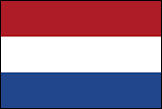
Java (Indonesien): Waffenstillstandsabkommen der Niederlande mit der indonesischen Unabhängigkeitsbewegung.
1948-01-27
Die Präsidentin der Siamese Women's Association, Mom Kobkaew Abhakorn na Ayudhaya (หม่อมกอบแก้ว อาภากร ณ อยุธยา, 1908 - 2008), ruft die Frauen auf, weniger ängstlich zu sein und ihre Wünsche und Bedürfnisse zu äußern.
Abb.: Mom Kobkaew Abhakorn - หม่อมกอบแก้ว อาภากร ณ อยุธยา (1908 - 2008), 1937
[Bildquelle: Wikipedia. -- Public domain]
1948-01-29

Parlamentswahl. Wahlbeteiligung 29,5%. Die Demokraten gewinnen in beiden Häusern. พันตรี ควง อภัยวงศ์ - Major Kuang Abhayavongsa (1902 - 1968) bleibt Ministerpräsident (นายกรัฐมนตรีแห่งราชอาณาจักรไทย - Prime Minister) und bildet ein neues Kabinet.
Viele Muslime in den Provinzen Yala (ยะลา), Satun (สตูล), Pattani (ปัตตานี) und Narathiwat (นราธิวาส) boykottieren die Wahl, da sie sich von den Siamesen schlecht behandelt fühlen.
Abb.: Lage der Provinzen Yala (ยะลา), Satun (สตูล), Pattani (ปัตตานี) und Narathiwat (นราธิวาส)
[Bildquelle: CIA. -- Public domain]
1948-01-30
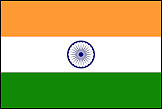
Neu Delhi (Indien): der Hindu Nathuram Vinayak Godse (नथूराम गोडसे, 1910 - 1949) ermordet Mohandas Karamchand Gandhi (મોહનદાસ કરમચંદ ગાંધી, geb. 1869)
Abb.: Mohandas Karamchand Gandhi (મોહનદાસ કરમચંદ ગાંધી), 1948-01
[Bildquelle: Wikimedia. -- Public domain]
1948-01-31 - 1963-09-16

Federation of Malaya (Persekutuan Tanah Melayu / ڤرسكوتوان تانه ملايو) Föderation der 11 Staaten:
- Johor (جوهر)
- Kedah (قدح)
- Kelantan (كلنتن)
- Malacca (Melaka)
Negeri Sembilan (نڬري سمبيلن)
- Pahang (ڤهڠ)
- Penang (Pulau Pinang / 槟城 / பினாங்கு)
- Perak (ڨيرق)
- Perlis (ﭬﺮليس)
- Selangor (سلاڠور)
- Terengganu (ترڠڬانو)
Abb.: Federation of Malaya auf Briefmarke
1948-02
Gründung von Gabungan Melayu Patani Raya (GAMPAR) (Association of Malays of Greater Patani. Ziel ist Anschluss der malaiischen Südprovinzen Thailands an die Federation of Malaya. Gründer: Tengku Mahmud Mahyudding, jüngster Sohn des letzten Sultan von Patani (ڤتتاني)
Abb.: Flagge von GaMPAR
[Bildquelle. Wikimedia. -- Public domain]GAMPAR ist die erste einer Reihe von separatistischen Organisationen in Südthailand:
Abb.: Genealogy of major Thai separatist organizations (1940 - present)
[Bildquelle: Abuza, Zachary: Conspiracy of silence : the insurgency in southern Thailand. -- Washington, DC : United States Institute of Peace Press, 2009. -- 293 S. ; 23 cm. -- ISBN 9781601270023. -- S. 19. -- Fair use]Erklärung der Abkürzungen:
GAMPAR = Gabungan Melayu Patani Raya (Association of Malays of Greater Patani)
PPM = Pattani People's Movement
BBMP = Barisan Bersatu Mujahideen Pattani (United Mujahideen Front of Pattani)
BIPP = Barisan Islam Pembebasan Pattani (Islamic Liberation Front of Pattani)BRN = Barisan Revolusi Nasional (National Revolution Front)
PULO = Pattani United Liberation Organization (Bertubuhan Pembebasan Pattani Bersatu)
GMIP = Gerakan Maujahideen Islamiya Pattani (Pattani Islamic Mujehideen Movement)
1948-02-02
Die Regierung kündigt an, das Opium-Rauchen in Siam zu reduzieren oder gar zu eliminieren. Es gibt in Siam Hunderte von lizentiierten Opiumhöhlen mit einem Jahresumsatz von über 100 Millionen Baht pro Jahr.
Abb.: Opiumhöhle, Opiummuseum, Chiang Saen - เชียงแสน, Provinz Chiang Rai - เชียงราย
[Bildquelle: Thomas Brauner. -- http://www.flickr.com/photos/thomasbrauner/846821555/. -- Zugriff am 2011-10-08. -- Creative Commons Lizenz (Namensnennung, keine kommerzielle Nutzung, share alike)]
Abb.: Lage von Chiang Saen (เชียงแสน)
[Bildquelle: OpenStreetMap. -- Creative Commons Lizenz (Namensnennung, share alike)]
1948-02-19 - 1948-02-22
Calcutta (কলকাতা, Indien): Conference of Youth and Students of Southeast Asia Fighting for Freedom and Independence
"The Conference of Youth and Students of Southeast Asia Fighting for Freedom and Independence, also referred to as the Southeast Asian Youth Conference, was an international youth and students event held in Calcutta, India on February 19–23, 1948.[1] It was co-organized by the World Federation of Democratic Youth and the International Union of Students. It has often been claimed that the conference was the starting point for a series of armed communist rebellions in different Asian countries.[2] Preparations
In 1947 a four-member delegation of WFDY travelled through different Asian countries. The delegation consisted of Olga Chechetkina (Soviet Union, journalist specialized in Southeast Asian affairs), Jean Lautissier, Rajko Tomović (Yugoslavia) and M. O. Oleson (Denmark). The purpose of the fact-finding tour was to survey the colonial situation and establish links with Asian youth movements.[1][3] The mission had initially been scheduled for 1946, but delayed due to the conflict in Vietnam and the refusal of French authorities to issue permits for the delegation to enter Vietnam.[3]
The delegation arrived in India in February 1947. They made contacts with different delegations that attended the Inter-Asian Relations Conference in Delhi. In Delhi, they discussed with Indonesian representatives the possibility of holding a pan-Asian youth conference in Indonesia in November 1947. In May, the WFDY team visited Indonesia and met with several high-ranking leaders (such as Sukarno, Hatta, etc.). In June 1947 the WFDY executive decided to go ahead with the plans, but limit the scope of the conference to Southeastern Asia. The Indonesians began preparations to host the conference in Madiun. However, in July 1947 (following the World Festival of Youth and Students), the WFDY executive decided to move the conference to Calcutta and postpone it to February 1948, as Indonesia was considered unsafe after Dutch attacks. The decision greatly disappointed the prospective Indonesian hosts.[3]
AttendanceThe conference was attended by delegations from Burma, China, Ceylon, India, Indonesia, Malaya, Nepal, Pakistan, the Philippines, the Soviet Union and Vietnam.[2][4][5] Indian organizations present included the All India Trade Union Congress, the All India Students Federation, the All India Kisan Sabha, the Socialist Unity Centre of India, the Andhra Youth Federation and a sector of the All India Students Congress.[6]
Malaya was represented by Lee Song.[1] The Indonesian delegation consisted of two persons, Francisca C. Fanggidaej and Supeno.[7] From Pakistan the Pakistan Federation of Democratic Youth was represented, amongst others.[6] The Soviet delegation consisted of Central Asians, amongst whom there were no high-ranking officials.[4][7] Jean Lautissier was the main WFDY representative at the Conference.[3]
Most of the participating delegates at the Conference were non-communists.[4] From India there was a delegation of the youth of the Indian National Congress, and from Burma a delegation from the AFPFL youth. Both of these delegations reacted sharply to statements condemning 'sham independence' in India and Burma, and left the Conference in protest.[2] Pro-Congress elements attacked a house where a reception was held for the Soviet delegation to the Conference. Two Indian youth leaders, Sushil Mukhopadhyay and Bhabamadhav Ghosh, were killed in the attack.[8]
Mass rallyA mass rally, with around 30,000 participants, was held in connection with the Conference. In the rally a Chinese delegate carried aloft a blood-stained shirt, from a Chinese communist fighter who had been killed in battle.[5]
Starting point for insurgencies?The conference was held in the same month as the second congress of the Communist Party of India, which also took place in Calcutta.[2][5] Some historians argue that these two events were utilized by the Cominform (then a newly founded body) to organize a large-scale armed communist rebellion across Asia.[2] Sir Francis Low writes (in Struggle for Asia) that "[t]he signal for action was given by the so-called South-East Asian Youth Conference which met in Calcutta in 1948 and was in reality a gathering of international Communist agents. There issued from the meeting a programme for insurrection and civil war which was carried, with dire results, to all the countries of South-East Asia."[9] Time Magazine wrote in October 1948 that "[t]he new plan was devised last March. Communist delegates attended a "Southeast Asia Youth Conference" in Calcutta. A planeload of experts from Moscow came to give them their orders. [...] After Words, Deeds. The plan worked out at Calcutta called for simultaneous revolts in Burma and Malaya. Three months after the outbreak of the Malayan revolt, Indonesia's Communists were to strike. As coordination center for the drive a 26-man Soviet Legation, largest in Southeast Asia, was set up in Bangkok."[10]
However, Bertil Lintner argues that there is no proof of any direct linkage between the Conference as such and the initiations of armed insurgencies in different Asian countries.[2] Ruth McVey states that whilst the Conference was the first public meeting of Southeast Asian communists after the Soviet declaration of the two-camp theory (that the world was divided into two camps, imperialism and socialism, and that confrontation between the two was unevitable), Asian communist were already aware of the new line prior to the Calcutta meeting. The Communist Party of India had adopted the new line of confrontation in December 1947.[3] Mari Olsen claims that it is unclear if the Calcutta conference would have been used to convey Soviet directives to Asian communists, as there were no senior Soviet representatives present."
[Quelle: https://en.wikipedia.org/wiki/Conference_of_Youth_and_Students_of_Southeast_Asia_Fighting_for_Freedom_and_Independence. -- Zugriff am 2016-04-28]
1948-02-20


Memorandum von Kenneth Perry Landon (1903 - 1993), US-State Department Southeast Asia Division assistant chief:
"The most recent reports in connection with the assassination of King Ananda to the effect that Khuang [Khuang Aphaiwong - ควง อภัยวงศ์, 1902 - 1968] is preparing to announce that King Bhumiphol killed his brother accidentally; that Bhumiphol will abdicate and that Prince Chumphot [Chumbhotbongs Paribatra, Prince of Nakhon Sawan - จุมภฏพงษ์บริพัตร, 1904 - 1959]will become King inject new elements into the situation which may profoundly disturb present political arrangements… Phibun [แปลก พิบูลสงคราม, 1897 - 1964] is antagonized by Khuang’s proposal that … Chumphot become King. It may be true that Bhumiphol killed his brother either intentionally or accidentally. Such a possibility was indicated by an earlier memorandum by me on this subject… This then becomes a deliberate attempt by Khuang to restore the monarchy to some of its former power and to establish Khuang and the Pramoj [ปราโมช] brothers firmly as the leaders of a royalist party and of the nation. They apparently hope that they can sustain themselves with Chumphot on the throne because Chumphot is a mature person of considerable wealth who has had long experience with palace politics, who has a large following among the Siamese and Chinese resident in Siam, and who is driven by an ambitious wife who, as the intelligent daughter of one of Siam’s cleverest Foreign Ministers is thoroughly familiar with internal and foreign political machinations…
Phibun and Pridi are political opponents within the same political party. They are equally opposed to any return of the monarchy to power. They do not object to the present King because he is immature and without a following. Khuang may be forcing them into each other’s arms by the specter of Chumphot as King."
[Quelle: http://www.zenjournalist.com/2013/03/thailands-saddest-secret/. -- Zugriff am 2014-10-27]
1948-02-21 - 1948-04-08
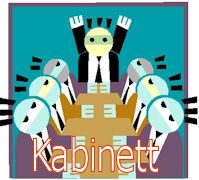
20. Kabinett: Khuang (ควง) IV
1948-02-23


Geheimes Telegramm des britischen Botschafters G. Thompson an das Foreign Office:
"2. Admiral THAMRONG [Thawan Thamrongnawasawat - พลเรือตรี ถวัลย์ ธำรงนาวาสวัสดิ์, 1901 - 1988]answered that the investigations carried out while he had "been in office excluded the possibility of suicide. They pointed to murder or accident. If the latter, the late King himself was not to blame. The tragedy had been caused "by the other one". Admiral THAMRONG did not go into any details, nor did he mention any names. He explained, however, that on being confronted with the findings of the investigators, he had told them frankly that there was nothing that the public could be told other than what they had heard on June 9th, 1946, namely that King ANANDA had died through "accident". Loyalty to the Royal family, he went on, imposed silence upon all who knew the facts, even upon the member of the Palace secretariat and the two pages who were now under arrest on suspicion. 3.
I report the foregoing for what it may be worth. It fits in with the line followed from the start and it supports what Prince CHUMPOT [Chumbhotbongs Paribatra, Prince of Nakhon Sawan - จุมภฏพงษ์บริพัตร, 1904 - 1959] said to me on November 28th (my telegram No. 1003 of the following day). There is some sad and sinister story behind this dread affair, a story that probably had nothing to do with politics."[Quelle: http://www.zenjournalist.com/2013/03/thailands-saddest-secret/. -- Zugriff am 2014-10-27]
1948-03

Gründung der Mon National Defence Organisation (MNDO)
1948-03-10
Erstes Heft von Thailands erster Frauenzeitschrift, Satree Sarn (สตรีสาร, Women's Voice, 1948 - 1996). Herausgeber: Nilawan Pinthong (นิลวรรณ ปิ่นทอง, 1914 - ).
Abb.: Ein späterer Hefttitel
[Fair use]
1948-03-16
Eröffnung eines vorläufigen Büros der Russischen Gesandtschaft im Ratanakosin Hotel (โรงแรมรัตนโกสินทร์), Bangkok
1948-03-17

In London wird eine Ausstellung siamesischer Kunst eröffnet. Zur Eröffnung sprechen Silpa Bhirasri (ศิลป์ พีระศรี, 1892 – 1962) und Reginald le May (1885 - ) über die Bedeutung des Buddhismus für die Kunst Siams.
1948-03-20
"Viele Frauen sind besser als eine" ist der Titel einer öffentlichen Diskussion über Polygamie in Bangkok. Polygamie war in Siam 1935 abgeschafft worden. Bis dahin konnte ein Mann des gemeinen Volkes offiziell drei Frauen haben: eine Hauptfrau (Mia Glang Muang - เมีย กลาง เมือง), eine Nebenfrau (Mia Glang Norng) und eine Sklavin (Mia Glang Tasee). Die Unterscheidung spielt eine Rolle bei der Höhe der Entschädigung, die ein Ehebrecher dem Ehemann zahlen musste sowie bei der Höhe des Erbteils der Frau nach dem Tod des Mannes.
Befürworter der Polygamie sind u. a. die Politiker: MR Kukrit Pramoj (คึกฤทธิ์ ปราโมช, 1911 - 1995), Bamrung Sukkhawad, Urai Rujiranond
"Prior to October 1, 1935 polygamy could be freely practiced and recognised under civil law in Thailand.[1][2] The old family law divided wives into three categories, all in accordance of the way in which they would become wives. There were three categories for a polygamous marriage, the first called "Mia Glang Muang (เมีย กลาง เมือง)," who would be the "official wife" that the husband's parents had "acquired for him," the second known as "Mia Glang Norng (เมีย กลาง น้อง)," the "minor wife" whom the man attained after his first marriage, and the third, "Mia Glang Tasee (เมีย กลาง ทาสี)," the title given to slave wives that were purchased from the mother and father of their prior owners.[3] While polygamy has since been abolished, it is still very much alive in Thailand [Mia Noy - เมีย น้อย], and according to reports, widely accepted.[4] Even still, such unions are not recognised under Thai law as in accordance with the law that states "A man or a woman cannot marry each other while one of them has a spouse."[5]
References
- Family Law of Thailand
- Law of Husband and Wives B.E. 1904
- Thai Family Law: Law of Husband and Wives B.E. 1904
- Chintana Yossoonthorn, Women in Thailand, Proceedings of the Peace Corps Conference on Women and Development Bangkok, 1979, p. 11.
- Civil and Commercial Code, Article 1452"
[Quelle: http://en.wikipedia.org/wiki/Polygamy_in_Thailand. -- Zugriff am 2011-10-09]
1948-03-22

Laut Bangkok Post besteht die Sowjetische Gesandtschaft samt Frauen und Kindern in Thailand aus 29 Personen. Dazu kommen noch 9 Männer und 14 Frauen aus der Sowjetunion, die nicht zur Gesandtschaft gehören.
"Even if all the men were in the Soviet security service, all their wives Mata Haris, and all the children sinister midgets in disguise, the Legation could not do one-tenth of the things attributed to it. For one thing it is under constant police surveillance. . . " [Quelle: A. Roth in: Bangkok Post. -- 1948-03-22. -- Zitiert in: Thompson, Virgina <1903 - 1990> ; Adloff, Richard: The left wing in Southeast Asia. -- New York : Sloane, 1950. -- Darin: Thailand (Siam). -- S. 73]
1948-03-25 - 1950-02-24
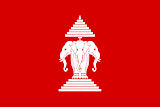
Prinz Boun Oum von Champasak (ເຈົ້າບຸນອຸ້ມ ນະ ຈຳປາສັກ, 1911/1912 - 1980) ist Ministerpräsident von Laos
Abb.: Prinz Boun Oum von Champasak (ເຈົ້າບຸນອຸ້ມ ນະ ຈຳປາສັກ), 1971
[Bildquelle: Dutch National Archives, The Hague, Fotocollectie Algemeen Nederlands Persbureau (ANEFO) / Wikimedia. -- Creative Commons Lizenz (Namensnennung, share alike)]
1948-03-30


Mamorandum des US-Botschafters Edwin F. Stanton (1901 - ) über ein Gespräch mit Thawan Thamrongnawasawat (พลเรือตรี ถวัลย์ ธำรงนาวาสวัสดิ์, 1901 - 1988):
Abb.: Ausschnitt aus dem Memorandum
[Bildquelle: http://www.zenjournalist.com/2013/03/thailands-saddest-secret/. -- Zugriff am 2014-10-27]
1948-04
In Thailand besuchen 175.000 Schüler chinesische Schulen. In Bangkok gibt es über 100 chinesische Schulen.
1948-04-06
Die Anführer des Militärputsches von 1947 erzwingen den Rücktritt von Ministerpräsident Major Kuang Abhayavongsa (พันตรี ควง อภัยวงศ์, 1902 - 1968). Am gleichen Tag wird Field Marshal Plaek Pibulsongkram (จอมพล ป. พิบูลสงคราม, 1897 - 1964) zum Ministerpräsidenten ernannt. Er bildet ein neues Kabinett.
Als erstes Land anerkennt Frankreich am 23. April die neue Regierung an. Die USA und Großbritannien warten zunächst ab.
1948-04-06 - 1957-09-16
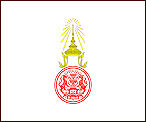
Field Marshal Plaek Pibulsongkram (จอมพล ป. พิบูลสงคราม, 1897 - 1964) ist zum zweiten Mal Ministerpräsident (นายกรัฐมนตรีแห่งราชอาณาจักรไทย - Prime Minister)
Siehe zu 1938-12-16 bis 1944-08-01
Abb.: จอมพล ป. พิบูลสงคราม - Field Marshal Plaek Pibulsongkram (1897 - 1964)
[Bildquelle: Wikipedia. -- Public domain]Seine Ministerpräsidentschaft steht u.a. unter dem Motto "Thailand den Thais!"
1948-04-07
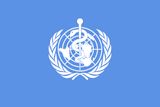
Genf (Schweiz): die World Health Organization (WHO) nimmt ihre Tätigkeit auf.
1948-04-08 - 1949-06-25

21. Kabinett: Pibul (พิบูลสงคราม) III
"Thai politics in the subsequent decade of Phibun’s second premiership, from April 8, 1948, to September 16, 1957, followed much the same pattern of political instability and violence, murder and rebellion, but with far greater tension and frequency, due to the complex tangle of conflicts between individuals—
- Pridi [ปรีดี พนมยงค์, 1900 - 1983] versus Phibun [แปลก พิบูลสงคราม, 1897 - 1964];
- Pridi versus Khuang [ควง อภัยวงศ์, 1902 - 1968];
- Pridi versus Seni [หม่อมราชวงศ์เสนีย์ ปราโมช, 1905 - 1997] and Kukrit [ม.ร.ว.คึกฤทธิ์ ปราโมช, 1911 -. 1995];
- Phibun [แปลก พิบูลสงคราม, 1897 - 1964], Phin [Chunhawan -จอมพลผิน ชุณหะวัณ, 1891 - 1973] and Phao [Sriyanond - เผ่า ศรียานนท์, 1910 - 1960] versus Kat [Katsongkhram -กาจ กาจสงคราม];
- Phao [Sriyanond - เผ่า ศรียานนท์, 1910 - 1960] versus many Free Thai [เสรีไทย] leaders and Isan [อีสาน] MPs;
- and Phao versus Sarit [Thanarat - สฤษดิ์ ธนะรัชต์, 1908 - 1963];
between groups—
- Pridi/Free Thai [ปรีดี / เสรีไทย] versus Phibun [พิบูล] group;
- Pridi/Free Thai versus royalists;
- Pridi/Free Thai versus Coup Group;
- army, navy and Bangkok versus Isan [อีสาน] politicians;
- Kuomintang [中國國民黨] versus Communist Chinese;
- southern Muslims versus local government officials;
- and radical workers, students, and journalists versus police, army, anti-communists, and conservative royalists;
between parties—
- Sahachip [พรรคสหชีพ] and Naeo Ratthathammanoon [พรรคแนวรัฐธรรมนูญ, Verfassungsfront] versus Prachathipat [พรรคประชาธิปัตย์, Democrat Party];
- Sahachip versus Naeo Ratthathammanoon;
- and Prachathipat versus Thammathipat [พรรคธรรมาธิปัตย์];
between institutions—
- army versus navy;
- police versus navy;
- army versus police;
- Thammasat University [มหาวิทยาลัยธรรมศาสตร์] versus army;
- and parliament versus government;
and between ideologies—
- "royalism versus democracy";
- "military dictatorship versus civilian democracy";
- "bourgeois democracy versus new democracy";
- "patriotism versus imperialism";
- "nation, religion, and monarchy [ชาติศาสน์กษัตริย์] versus communism";
- and "communism versus capitalism."
[Quelle: Kasian Tejapira [เกษียร เตชะพีระ] <1957 - >: Commodifying Marxism : the formation of modern Thai radical culture, 1927-1958. -- Kyoto : Kyoto Univ. Pr., 2001. -- 390 S. : Ill. ; 23 cm. -- (Kyoto area studies on Asia ; 3). -- ISBN 1876843985. -- Revision of the author's thesis (doctoral) -- Cornell University, 1992. -- S. 83]

Die Regierung Phibun setzt die Quote für chinesischen Einwanderer pro Jahr von 10.000 auf 200 herunter.
1948-04-14
Tausende pilgern ins Wat Phatanaram, Surat Thani (สุราษฎร์ธานี), um den mumifizierten Leichnam des 1942 verstorbenen Abtes Luang Poh Pathanabhong zu sehen. Der Leichnam war auf 2/3 seiner ursprünglichen Größe geschrumpft und wirkte wie versteinert.
Abb.: Lage von Surat Thani (สุราษฎร์ธานี)
[Bildquelle: OpenStreetMap. -- Creative Commons Lizenz (Namensnennung, share alike)]
1948-04-18
Die kommunistische Wochenzeitung Mahachon (มหาชน, 'Die Massen') reagiert auf die Wiederkunft Phibuls mit einem Leitartikel:"Demokratie unter Panzerketten"
1948-04-25


Britisches und siamesisches Militär und Polizei gehen gemeinsam an der siamesisch-malaiischen Grenze gegen Banditen, Separatisten und kommunistische Guerillas vor.
1948-04
Ministerpräsident Pibul gründet die Gewerkschaft Thai Labor Union unter seinem Patronat. Damit will er die Arbeiter von ihren kommunistischen Genossen abspalten. Generalsekretär bis 1953 ist Sang Pathanothai (สังข์ พัธโนทัย, 1915 - 1986).
Das Hauptquartier der Gewerkschaft Central Labor Organization (CLO) wird gestürmt, um Beweise für (angebliche) kommunistische Tätigkeiten zu bekommen.
"Diese neue Entwicklung ließ auch den linken Flügel der eigenen Anhängerschaft des Feldmarschalls und Premiers [Pibul] stärker in den Vordergrund treten. Ein Exponent dieses Flügels war der Gewerkschaftsführer und Publizist Sang Phathanothai [สังข์ พัธโนทัย, 1915 - 1986] geworden, der schon seit den späten 30er Jahren die Politik Phibuns vertreten und den Buddhismus in den Dienst dieser politischen Aufgabe gestellt hatte. Der 1915 in der Provinz Samut Prakan [สมุทรปราการ] geborene Sang Phathanothai war von Beruf Lehrer und schloss seine Ausbildung mit einer Prüfung in den Fächern Geschichte, Literatur und Englisch ab. Sein späterer Lebenslauf brachte ihn zeitweilig an die Chulalongkorn Universität [จุฬาลงกรณ์มหาวิทยาลัย] Bangkoks und an die Universität Oxford. Neben dem Buddhismus interessierte er sich auch für die anderen Weltreligionen. Seine wohl früheste politische Tätigkeit war die Teilnahme an einem Schulstreik im Jahre 1932. Schon während seiner Tätigkeit als Lehrer schrieb er Beiträge für den staatlichen Rundfunk. Als er 1944 zusammen mit Luang Phromyoti, Luang Seriroengrit [จรูญ รัตนกุล เสรีเริงฤทธิ์, 1895 - 1983], Phra Sarasat Pholakhan [พระสารสาสน์พลขันธ์, 1889/90 - 1966], Prayun Phrommontri [ประยูรพรหมมนตรี] und Phra Rachathammaniret als Kriegsverbrecher festgenommen wurde, war er genau zehn Jahre im Staatsdienst gewesen. Obwohl er zwar behauptete, er habe mit Phibun die Japaner während des Zweiten Weltkrieges bekämpft, war wohl seine Hauptwirkung in der Verbreitung von nationalistischen Ideen. Damals war er ein wichtiges Mitglied der Propaganda-Abteilung der Regierung des Feldmarschalls Phibun Songkhram. Unter anderem wirkte er an der Produktion des bekannten Zwiegesprächs "Herr Man - Herr Khong" [Mr. Man Chuchart (มั่น ชูชาติ) und Mr. Khong Rakthai (คง รักไทย)] mit, das während der Indochinakrise im Zweiten Weltkrieg zeitweilig zweimal täglich über den thailändischen Rundfunksender ausgestrahlt wurde.
Das Fiasko der ersten Phibun-Ära, die Niederlage Japans und die Verurteilung der wichtigsten Regierungsmitglieder als Kriegsverbrechen müssen bei Sang Phathanothai eine geistige Metamorphose ausgelöst haben. Der Einfluss sozialistischer Ideen, der ja - wie dargestellt - erst Ende der 40er und Anfang der 50er Jahre deutlicher unter den Thai-Politikern spürbar wurde, sowie die Neugruppierung der mächtigen Cliquen in der Thai-Politik müssen ebenfalls eine Rolle gespielt haben, dass sich Sang Phathanothai um 1957 im sozialistischen Lager befand, allerdings wiederum als ein Mann von Phibun Songkhram. Diese Metamorphose kündigte sich bereits früher an. Schon in seinem Buch "Gedanken im Gefängnis” [ความนึกในกรงขัง. -- 2499 (= 1956)], das sich mit seiner Haftzeit als Kriegsverbrecher befasst, glaubt er "an die Grundsätze des Sozialismus von Mahatma Gandhi [મોહનદાસ કરમચંદ ગાંધી, 1869 - 1948]" und bekennt sich dazu, den Gegner nicht als Feind zu betrachten und ihn nicht durch falsche Beschuldigungen und Unwahrheiten zu vernichten.
Abb.: EinbandtitelSang berief sich schon in jenem Buch auf den Buddha, der in der gemeinschaftlichen und gemeinwirtschaftlichen Ordnung des buddhistischen Ordens ein Beispiel für die Überwindung der Klassen und Kasten gesetzt habe. Die Kritik richtet sich vor allem gegen die Kapitalisten und Feudalisten, und die Ausführungen gipfeln immer wieder in dem Appell, das Gemeinwohl über das Privatwohl jedes Einzelnen zu stellen.
So war Sang Phathanothai der geeignete Mann, als ihm 1957 die Führung des Thai National Trades Union Congress (TNTUC) [สมาคมกรรมกรไทย] übertragen wurde. Er war auch ein wichtiger Kontaktmann von Phibun bei den Versuchen, gemäßigt sozialistische Kräfte in das Regierungslager zu integrieren.
Er stand in enger Verbindung mit der sozialkritischen Mönchsbewegung um 1957 in Wat Mahathat [วัดมหาธาตุ ยุวราชรังสฤษฎิ์ ราชวรมหาวิหาร] und gab der teils oppositionellen Publizistik seine stillschweigende Unterstützung. Auch gab er eine Tageszeitung heraus, die ebenfalls einen deutlichen Linkskurs steuerte, nichtsdestoweniger aber von Phibun mitfinanziert war. Die Artikel in dieser Zeitung "Sathiaraphap" (Stabilität) waren der äußere Anlass für die Festnahme von Sang Phathanothai im Jahre 1958 durch die Regierung Sarit. War Sang 1944 festgenommen worden wegen Mitwirkung an Kriegsverbrechen zugunsten der semi-faschistischen Militärherrschaft von Phibun Songkhram, so wurden ihm jetzt kommunistische Umtriebe und Verbrechen gegen die Sicherheit des Landes vorgeworfen. Aber auch diesmal war er ein Mann Phibuns gewesen, der allerdings zum Zeitpunkt seiner Festnahme bereits längst im Exil lebte. Die Zeitung "Sathiaraphap" [เสถียรภาพ] steuerte einen Peking gegenüber nicht unfreundlichen Kurs und befasste sich in mehreren Beiträgen mit Fragen der Vereinbarkeit von Buddhismus und Sozialismus. Hier war es auch, wo zuerst der Reisebericht von Phra Maha Manat und einigen anderen Mönchen abgedruckt war, die auf Einladung der chinesischen buddhistischen Vereinigung nach Peking gereist waren. In einem anderen Artikel aus dem Jahre 1958 wurde die These vertreten, dass Karl Marx mit der Verurteilung der Religion als Opium für das Volk insofern recht gehabt habe, als sich dieses Urteil auf die götterverehrenden Religionen beziehe.
"Aber der Buddhismus beruht ja auf Wahrheit. Deshalb gibt es nichts Widersprechendes zwischen Buddhismus und dem Denken von Marx".
Außerdem erschienen in der Zeitung philosophische Beiträge und historische Darstellungen Besondere Kritik wurde an dem Militärbündnis der SEATO geübt.
In dem Prozess, der Sang Phathanothai schließlich nach vielen Jahren der Untersuchungshaft im Jahre 1965 gemacht wurde, stützte Sang seine sozialistischen Vorstellungen in noch viel stärkerem Maße mit dem Buddhismus. Er bekannte sich zum Buddhismus und zum Fabian-Sozialismus, ohne allerdings im wesentlichen von seinen Stellungnahmen in den späten 50er Jahren abzurücken, die ihm zum Vorwurf gemacht wurden. Seine Verteidigung lief praktisch darauf hinaus, dem Gericht eine Lektion über Philosophie und Geschichte von Sozialismus und Kommunismus zu geben und die Achtbarkeit seiner politischen Anschauungen durch angesehene Persönlichkeiten wie Gandhi, U Nu [ဦးနု, 1907 - 1995], Sukarno und Nasser [جمال عبد الناصر, 1918 - 1970], ja sogar Chulalongkorn, der das Kooperative-Prinzip verwendet habe, zu stützen. Sang Phathanothai berief sich sogar auf Rama VII, der sich selbst als Sozialist bezeichnet habe. Die Ideen des Materialismus, die in den Artikeln von "Sathiaraphap" stets eine bedeutende Rolle gespielt hatten, stützte er durch Hinweise auf die buddhistische Schrift "Milindapañhā". Dort komme ebenfalls zum Ausdruck, dass "Rūpa-dhamma" und "Nāma-dhamma" voneinander abhängen und gemeinsam erscheinen. Es gebe keine Existenz, die nur auf "Nāma-dhamma" beruhe. Sang versucht verschiedentlich zu beweisen, dass der Sozialismus eine auf wissenschaftlichen Grundsätzen beruhende Philosophie vom Traum der Menschen nach Gerechtigkeit und materiellem Überfluss sei, wie sie in der Idee des künftigen Buddha Ariya Mettayya [พระศรีอริยเมตไตรย] oder in der Erwartung des islamischen Mahdi [المهدي] zum Ausdruck komme.
Vor allem warnte er vor der - seiner Meinung nach von den USA entwickelten - Strategie, den Buddhismus gegen den Kommunismus einsetzen zu wollen. Vor Gericht erklärte er:
"Wenn die Propagandisten verbreiten, der Kommunismus zerstöre die Religion, so erreicht man damit nicht, dass die Menschen den Kommunismus verurteilen. Denn es ist allgemein bekannt, dass die Kommunisten den Menschen dabei helfen wollen, dem Leiden zu entrinnen und die Ausbeutung des Menschen durch den Menschen zu beseitigen. Je mehr wir verbreiten, dass die Religion durch den Kommunismus zu bestehen aufhöre, umso mehr wird sich der Eindruck verstärken, dass die Religion der Gegner der Armen sei und dass sie die Ausbeutung des Menschen durch den Menschen fördere".
Wenn der Eindruck entstehe, dass die Religion für die Kapitalisten und Feudalisten da sei und dass sie den Kommunismus bekämpfe, dann sei in der Tat die Religion in ihrer Existenz bedroht. Dabei sei es doch die Absicht jeglicher Religion, der Welt dabei behilflich zu sein, dem Leiden zu entrinnen. Erneut erklärt Sang Phathanothai den Siegeszug des Buddhismus mit der Tatsache, dass der Buddha die Kastengesellschaft Indiens abgelehnt habe. Die Unterprivilegierten der indischen Gesellschaft hätten deshalb der Lehre des Buddha zur Ausbreitung verholfen. Für die neue gesellschaftliche Ordnung habe der Buddha im Mönchsorden ein Beispiel gesetzt:
"Wer als buddhistischer Mönch ordiniert war, der weiß, dass jeder in den Orden eintreten kann, gleichgültig welcher Rasse oder Klasse er auch immer angehört. Denn in der Gemeinschaft der Schüler des Buddha gibt es keine Klassen, Kasten oder Ränge. Wer schon längere Zeit ordiniert ist, verfügt über größere Seniorität, als der, der später in den Orden eintritt. Und nur auf der Seniorität beruht der Respekt der anderen. Reichtum und Rang spielen keine Rolle. Die Gesellschaft der Schüler des Buddha ist daher eine Gesellschaft, die man als klassenlose Gesellschaft bezeichnen kann, die höchste Form der Demokratie also".
Sang Phathanothai kann als typischer Vertreter jener Kräfte angesehen werden, die eine Verbindung von nationalistischen Vorstellungen suchten. Deren Exponenten, Phibun Songkhram und Pridi Phanomyong [ปรีดี พนมยงค์, 1900 - 1983], während und nach der Revolution von 1932 mehr oder weniger vereint, waren seit 1947 durch einen tiefen Bruch voneinander getrennt. Aber der Wunsch in bestimmten Kreisen der politischen Öffentlichkeit nach einer Kooperation dieser beiden Politiker war immer wieder erkennbar. 1949, als Phibun Songkhram wieder zwei Jahre an der Macht war und Pridi längst im chinesischen Exil lebte, nahm die Polizei sechs Männer fest, die im Namen einer "Gesellschaft der rot-gezähnten Elephanten" Flugblätter verteilt hatten, auf denen die Kooperation zwischen Phibun und Pridi gefordert wurde. 1957 setzte Sang Phathanothai einige Hoffnungen auf Feldmarschall Sarit [สฤษดิ์ ธนะรัชต์, 1908 - 1963], dessen Partei damals in ihrem Namen Nationalismus und Sozialismus verbunden hatte. Er strebte aber nicht nur eine solche ideologische sondern auch eine personelle Verbindung an. Als sich Feldmarschall Sarit bereits durch Staatsstreich an die Macht gebracht hatte und Phibun Songkhram im Exil lebte, versuchte Sang eine Begegnung zwischen diesem und dem ebenfalls exilierten Pridi Phanomyong zu vermitteln, die jedoch aufgrund äußerer Umstände scheiterte."
[Quelle: Skrobanek, Walter <1941 - 2006>: Buddhistische Politik in Thailand : mit besonderer Berücksichtigung des heterodoxen Messianismus. -- Wiesbaden : Steiner, 1976. -- 315 S. ; 24 cm. -- (Beiträge zur Südasienforschung ; 23). -- ISBN 3-515-02390-9. -- Zugl.: Heidelberg, Univ., Diss., 1972. -- S. 188 - 192. -- Mit Erlaubnis des inzwischen verstorbenen Autors]
1948-05

Die USA anerkennen die Regierung Pibul (พิบูลสงคราม)
1948-05
Die Regierung verbietet die Gründung neuer chinesischer Schulen. Die Zahl der bestehenden chinesischen Schulen wird auf 152 reduziert.
1948-05-05
Dorfschullehrer werden verbeamtet und rechtlich mit den übrigen Staatsbeamten gleichgestellt. Ihre Bezahlung ist die der niedrigsten Besoldungsgruppe in Ministerien.
1948-05-12
Der Sekretär der Muslim Liga fordert beschränkte Autonomie für die vier südlichen Provinzen mit einer malayisch-muslimischen Mehrheit. Banchon Srirachoon, Mitglied des Oberhauses, fordert einen Islam-Berater am Hof. Auch sollten Beamte im Süden, die Malayisch können, eine Zulage von 20% ihres Gehaltes bekommen. Der Unkenntnis der Sprache der Bevölkerung führt zu vielen Missverständnissen bzw. Unverständnis für die Anliegen des Volkes. Weiterhin fordert Banchon die Absetzung eines hohen Polizisten in Narathiwat (นราธิวาส), der einfach exekutiert.
Abb.: Lage der muslimischen Provinzen Yala (ยะลา), Satun (สตูล), Pattani (ปัตตานี) und Narathiwat (นราธิวาส)
[Bildquelle: CIA. -- Public domain]
1948-05-14

Gründung der RAND Corporation (Research ANd Development). Sie ist das bekannteste Federal Contract Research Center.
Abb.: ®LogoDie Mission:
"To further and promote scientific, educational, and charitable purposes, all for the public welfare and security of the United States of America. "
1948-05-20
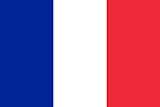
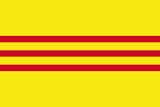
Auf Initiative Frankreichs wird in Saigon Bảo Đại (1913 - 1997) von einem Nationalkongress zum Ministerpräsidenten einer provisorischen Zentralregierung von Vietnam gewählt. Damit will man eine Machtübernahme des kommunistischen Việt Minh verhindern.
1948-05-28 - 1954-05-23
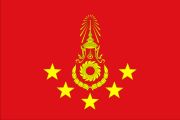
Field Marshal Phin Choonhavan (จอมพล ผิน ชุณหะวัณ, 1891 - 1973) ist Commander-in-Chief of the Royal Thai Army (ผู้บัญชาการทหารบก)
Abb.: Phin Choonhavan (จอมพล ผิน ชุณหะวัณ)
[Fair use]
1948-06 - 1952-12

Die Büros der kommunistischen Tageszeitung 川民報 [Chuanmin Pao] / hrsg. von der chinesischen kommunistischen Buchhandlung 大众文化 [Dazhong Wenhua - Massenkultur] werden fünf Mal von der Polizei durchsucht. Insgesamt werden über 60 Mitarbeiter festgenommen und zahlreiche Materialien beschlagnahmt.
1948-06

Alexander MacDonald (1908 - 2000), Jorges Orgibet (1907-1986) und Willis Bird ( - 1991) gründen den Nachtclub Silver Palm Club in Surawong Road (ถนนสุรวงศ์)
Abb.: Annonce
Abb.: Lage der Surawong Road (ถนนสุรวงศ์)
[Bildquelle: OpenStreetMap. -- Creative Commons Lizenz (Namensnennung, share alike)]
1948-06-10
Die Regierung verbietet, dass Schulmädchen Locken tragen und dass Schulbuben Haar länger als 1 cm tragen. Schüler und Schülerinnen dürfen keine Liebesgeschichten mit in die Schule nehmen. All dies soll der Erhaltung der Moral dienen.
1948-06-16 - 1960-07-12

Malayan Emergency (Darurat; ضرورت): Terrorismus und Guerillakampf chinesischstämmiger Kommunisten. Von Sungei Siput ausgehend sich schnell ausbreitend.
Abb.: Lage von Sungei Siput
[Bildquelle: OpenStreetMap. -- Creative Commons Lizenz (Namensnennung, share alike)]
Abb.: Ein Avro Lincoln Bomber A73-33 der australischen Luftwaffe bombardiert den malaiischen Dschungel, wo Aufständische vermutet werden, ca. 1950
[Bildquelle: Wikipedia. -- Public domain]
Abb.: Wird von Briten gegen Malaien eingesetzt: British No. 5 MKI Lee-Enfield "Jungle Carbine"
[Bildquelel: Nemo5576 / Wikipedia. -- Namensnennung]
"The Malayan Emergency (Malay: Darurat; Jawi: ضرورت) was a guerrilla war fought between Commonwealth armed forces and the Malayan National Liberation Army (MNLA, 马来亚民族解放军), the military arm of the Malayan Communist Party (MCP, Parti Komunis Malaya), from 1948 to 1960. The Malayan Emergency was the colonial government's term for the conflict. The MNLA termed it the Anti-British National Liberation War.[1] The rubber plantations and tin mining industries had pushed for the use of the term "emergency" since their losses would not have been covered by Lloyd's insurers if it had been termed a "war".[2]
Despite the communists' defeat in 1960, communist leader Chin Peng (陳平, 1924 - ) renewed the insurgency in 1967; it lasted until 1989, and became known as the Communist Insurgency War. Although Australian and British armed forces had fully withdrawn from Malaysia years earlier, the insurgency still failed."
[Quelle: http://en.wikipedia.org/wiki/Malayan_Emergency. -- Zugriff am 2013-06-10]
Zur Malayan Emergency siehe:
Barber, Noel <1909 - 1988>: The war of the running dogs : How Malaya defeated the Communist guerillas 1948 - 1960. -- Paperback ed. of the first ed. 1971. -- London : Cassell, 2004. -- 336 S. : Ill. ; 20 cm. -- ISBN 978-0-3043-6671-2
Abb.: Einbandtitel
1948-06-17

Die US-Physiker John Bardeen (1908 - 1991) und Walter Brattain (1902 - 1987) melden den Transistor als Patent an.
Abb.: Der erste Transistor
[Bildquelle: Unitronic / Wikimedia. -- Creative Commons Lizenz (Namensnennung, share alike)]
1948-06-21 - 1950-01-26

Chakravarti Rajagopalachari (சக்ரவர்தி ராஜகோபாலாச்சாரி, 1878 – 1972) ist der letzet Governor-General of the Union of India.
1948-06-28

Die Kominform (Коминформ, Informationsbüro der Kommunistischen und Arbeiterparteien) schließt die von Josip Broz Tito (1892 - 1980) geleitete Kommunistische Partei Jugoslawiens aus. König Bhumibol wird ein Verehrer Titos sein.
1948-06-25
Phibun führt die Unruhen im Süden auf kommunistische Agitation zurück. Alle Angestellten im öffentlichen Dienst müssen auf Sympathien zum Kommunismus überprüft werden.
1948-07
Die Büros der Zeitung Chung Ming Pao werden vom Staat gestürmt. Die Zeitung ist nach dem Verbot von Pang Shin Chan Pao vor einigen Wochen die einzige radikale Zeitung Bangkoks. Pang Shin Chan Pao war das Organ der China Democratic League (中國民主同盟). Die Auflage von Chung Ming Pao steigt bis Februar
1848-07 - 1948-09
Es erscheint:
นรินทร์ ภาษิด [Narin Phasit] <1874 - 1950>: ชวนฉลาด. -- Bd. 1 - 3. -- Bangkok : Uthai, 1948-07 - 1948-09. -- "Einladung zur Klugheit"
"As for the newspapers The Front Line [แนวน้า], The Thai Line (Naeo thai) [แนวไทย], and Freedom (Itsara) [อิสระ] of Narin during the era of 1937, they were all ordered to be "Shut!" "Shut!" "Shut!" Altogether, these three newspapers lasted only a total of sixteen days. How extraordinarily enjoyable it was for me!" [Übersetzung: Koret, Peter: The man who accused the king of killing a fish : the biography of Narin Phasit [นรินทร์ ภาษิด] of Siam (1874-1950). -- Chiang Mai : Silkworm, 2012. -- 397 S. : Ill. ; 21 cm. -- ISBN 9786162150432. -- S. 286. -- Fair use]
"Had they officially charged Narin, how fun it would have all been! And how much shame they would have felt when they were finally forced to release him! Instead, they brought both Narin and Sunarin Sukhon to the military school of indoctrination at the infantry camp at Khok Krathiam [โคกกระเทียม] in the province of Lopburi [ลพบุรี]."
Abb.: Lage von Khok Krathiam [โคกกระเทียม]
[Bildquelle: OpenStreetMap. -- Creative Commons Lizenz (Namensnennung, share alike)][Übersetzung: Koret, Peter: The man who accused the king of killing a fish : the biography of Narin Phasit [นรินทร์ ภาษิด] of Siam (1874-1950). -- Chiang Mai : Silkworm, 2012. -- 397 S. : Ill. ; 21 cm. -- ISBN 9786162150432. -- S. 302. -- Fair use]
"It is the act of having one foot in a door that should have been wedged very tight that is to result in the series of oddities that are to be catalogued systematically in an article entitled "The Strangest Elections in the World, " published three months afterwards in Narins final magazine. In the words of Mr. Phasit, these oddities include:
- Before eight in the morning when the elections officially opened, the electoral committee did not open the box of ballots as a sign of their honesty [i. e„ in order to prove that ballots had not already been placed inside], as is the common practice. This is the first point of oddity.
- The second point of oddity is that almost all of the people who exercised their right to vote in this district were soldiers dressed in uniform. There was a commander who supervised them in a very disciplined fashion. When they entered the column [and lined up to vote], their names were called out in systematic manner. Whoever was in front of the line answered, and then took the ballot without having to appear before the election committee members and show their name and address, as is required of the general public. And what is oddest of all is that for the most part the soldiers who picked up the ballots all looked remarkably alike as if they were in fact one and the same person. This is the second point of oddity.
- The third point of oddity is that prior to the day of the election, a total of just over fifteen thousand names were listed on the register of people entitled to vote in this district. However, during the election itself it turned out there were more than twenty thousand additional people who actually cast their ballot. And what is of the greatest oddity is the sheer impossibility of having this number of people place their votes into the ballot box. There were ten hours allotted for the election, or a total of six hundred minutes. During this time there were over ten thousand people who cast their votes for Khun Plot alone. If we do our calculations, this means that on the average there were over fourteen people who were voting for him per minute."
[Quelle: Koret, Peter: The man who accused the king of killing a fish : the biography of Narin Phasit [นรินทร์ ภาษิด] of Siam (1874-1950). -- Chiang Mai : Silkworm, 2012. -- 397 S. : Ill. ; 21 cm. -- ISBN 9786162150432. -- S. 324f. -- Fair use]
1948-07-09
Die Regierung droht, chinesische Vereine zu verbieten. Anlass ist eine Zeitungsnotiz, die eine Vereinigung der chinesischen Jugendorganisation (Chinese Youth Movement) in Siam mit der Kuomintang Partei (中國國民黨) fordert. Vorausgegangen waren wochenlange Auseinendersetzungen über das Hissen chinesischer Fahnen an Schulen in Bangkok. Dies wurde aufgrund des Flag Act von 1936 verboten. Daraufhin weigerten sich chinesische Schulen, die siamesische Fahne täglich zu hissen, wozu sie nach dem Private School Act verpflichtet sind. Wegen ihrer Weigerung, die siamesische Fahne zu hissen, werden 14 chinesische Schulen in und um Bangkok geschlossen.
Laut Volkszählung sind 31% der Bevölkerung Bangkoks Chinesen, 68% Siamesen.
Abb.: Flagge Thailands
[Bildquelle: Wikipedia. -- Public domain]
Abb.: Flagge Chinas
[Bildquelle: Wikipedia. -- Public domain]
Abb.: Richtig beflaggte Schule, Wat Pa Kanun, Uttaradit - อุตรดิตถ์
[Bildquelle: Tevaprapas Makklay / Wikimedia. -- Creative Commons Lizenz (Namensnennung)]
Abb.: Lage von Uttaradit (อุตรดิตถ์)
[Bildquelle: OpenStreetMap. -- Creative Commons Lizenz (Namensnennung, share alike)]
"The history of Chinese immigration to Thailand dates back many centuries. Chinese traders in Thailand, mostly from Fujian (福建) and Guangdong (廣東), began arriving in Ayutthaya (อยุธยา) by at least the thirteenth century. According to the Chronicles of Ayutthaya, it was mentioned that King Ekathotsarot (พระบาทสมเด็จพระสรรเพชญ์ที่ 3, r. 1605-1610) had been "concerned solely with ways of enriching his treasury," and was "greatly inclined toward strangers and foreign nations," especially Portugal, Spain, the Philippines, China, and Japan. Ayutthaya was under almost constant Burmese threat from the 16th century onwards, and Qianlong (乾隆帝), the Emperor of Qing (清朝) was alarmed by the Burmese military might. From 1766-1769, Qianlong sent his armies four times to subdue the Burmese, but all four invasions failed. Ayutthaya thus fell to the Burmese in 1767. The Chinese efforts diverted the attention of Burma's Siam army, General Taksin (ตากสิน), who was the son of a Chinese immigrant, took advantage of the situation by organizing his force and attacking them. Taksin actively encouraged Chinese immigration and trade. Settlers principally from Chaozhou (潮州) prefecture came in large numbers.[14]
The Chinese population in Thailand jumped from 230,000 in 1825 to 792,000 by 1910. By 1932, approximately 12.2% of the population of Thailand was Chinese.[15]
However, early Chinese immigration consisted almost entirely of Chinese men who married Thai women. Children of such intermarriages were aptly called Sino-Thai[16] or known as Luk-jin (ลูกจีน) in Thai.[17] This tradition of Chinese-Thai intermarriage declined when large numbers of Chinese women began to emigrate into Thailand in the early 20th century.
The corruption of the Qing Dynasty and the massive population increase in China, along with very high taxes, caused many men to leave China for Thailand in search of work. If successful, they sent money back to their families in China. Many Chinese prospered under the "tax farming" system, whereby private individuals were sold the right to collect taxes at a price below the value of the tax revenues.
In the late 19th century, when Thailand was busy defending its independence from the colonial powers, Chinese bandits from Yunnan Province began raids into the country in the Haw wars (Thai: ปราบกบฏฮ่อ). Thai nationalist attitudes at all levels were accordingly colored by anti-Chinese sentiment. Members of the Chinese community had long dominated domestic commerce and had served as agents for the royal trade monopolies. With the rise of European economic influence, however, many Chinese shifted to the opium traffic and tax collecting, both of which were despised occupations. In addition, Chinese millers and rice traders were blamed for an economic recession that gripped Siam for nearly a decade after 1905. Accusations of bribery of officials, wars between the Chinese secret societies, and use of violent tactics to collect taxes served to foster Thai resentment against the Chinese at a time when the community was expanding rapidly due to immigration.
By 1910, nearly 10 percent of Thailand's population was Chinese. Moreover, the new arrivals frequently came in families and resisted assimilation. Chinese nationalism, encouraged by Sun Yat-sen (孫逸仙), the leader of the Chinese revolution, had also begun to develop, parallel with Thai nationalism. The Chinese community even supported a separate school system for its children.
Legislation by King Rama VI (1910-1925) that required the adoption of Thai surnames was largely directed at easing tensions with Chinese community by encouraging assimilation. Thai Chinese had to choose between forsaking their Chinese identity or being regarded as foreigners. Most opted to become Thai.
A number of ethnic Chinese families left Burma between 1930 and 1950 and settled in the Ratchaburi (ราชบุรี) and Kanchanaburi (กาญจนบุรี) Provinces of Western Thailand. A few of the ethnic Chinese families in that area had already emigrated from Burma in the 19th century. Ethnic Chinese families can be recognized by the shrines in their homes and shops, which are mostly located straight on the ground and painted in red, decorated with gold tinsel and small red lamps.
The Chinese in Thailand also suffered discrimination between the 1930s to 1950s under the military dictatorship of Prime Minister Plaek Pibulsonggram, (in spite of being part-Chinese himself).[18] State corporations took over commodities such as rice, tobacco and petroleum, and Chinese businesses found themselves subject to a range of new taxes and controls.
Nevertheless, the Chinese were still encouraged to become Thai citizens, and by 1970 it was estimated that more than 90 percent of the Chinese born in Thailand had done so. When diplomatic relations were established with China[19] in the 1970s, resident Chinese not born in Thailand were offered the chance of becoming Thai citizens. The remaining permanent resident Chinese alien population was then estimated at less than 200,000.
Dialect groups
Abb.: Herkunft der wichtigsten chinesischen Sprachgruppen Thailands
[Bildquelle: Minority groups in Thailand / Joann L. Schrock [u. a.]. -- Washington: Headquarters, Dept. of the Army, 1970. -- 1135 S. : Ill. ; 24 cm. -- (Ethnographic study series) (Department of the Army pamphlet ; no. 550-107). -- S. 97]The vast majority of the Thai Chinese belong to various southern Chinese dialect groups. Of these, 56% are Teochew (潮州話) (also commonly spelled as Teochiu), 16% Hakka (客家話) and 11% Hainanese (海南话). The Cantonese ( 廣東話) and Hokkien (福建话) each constitute 7% of the Chinese population, and 3% belong to other Chinese dialect groups.[20]
The Teochews mainly settled around Chao Phraya River (แม่น้ำเจ้าพระยา) in Bangkok. Many of them worked in government sectors, while others were involved in trade. During the reign of King Taksin, some influential Teochew traders were granted certain privileges. These prominent traders were called "Royal Chinese" (Jin-luang in Thai).
The Hokkiens constitute the largest dialect group among the Chinese in Songkhla (สงขลา) and Phuket (ภูเก็ต), while the Hakkas are mainly concentrated in Chiang Mai (เชียงใหม่), Phuket(ภูเก็ต), and Central Western provinces. The Hakka own many private banks in Thailand, notably Kasikorn Bank (früher: Thai Farmer's Bank - 泰华农民银行).
A large number of Thai Chinese are the descendants of intermarriages between Chinese immigrants and Thais, while there are others who are of predominantly or solely of Chinese descent. People who are of mainly Chinese descent are descendants of immigrants who relocated to Thailand as well as other parts of Nanyang (南洋) (the Chinese term for Southeast Asia used at the time) in the early to mid 20th century due to famine and civil war in the southern Chinese provinces of Guangdong (廣東) (Teochew, Cantonese, Hainan, Hakka groups) and Fujian (福建) (Hokkien, Hakka). Among the ethnic Chinese, assimilation and adoption of Thai culture tends to take place among the Chinese who have a significant amount of Thai ancestry.
In the southern Thai provinces, notably the Chinese community in Phuket Province (ภูเก็ต), the assimilated group is known as Peranakans. These people share a similar culture and identity with the Peranakan Chinese in neighboring Indonesia, Singapore, and Malaysia.[21][22][23] Ethnic Chinese in the Malay-dominated provinces in the south used Malay, rather than Thai as their lingua franca, and occasionally intermarry with the local Malays.[24]
Substantial numbers of Chinese people of (mainly) Yunnanese ( 雲南) descent can be found in villages around Chiang Rai Province (เชียงราย). These are descendants of Kuomintang (中國國民黨) soldiers who fought against the Chinese Communist soldiers in the 1940s, before fleeing to the northern regions and settling among the local people.[25][26][27] The Chinese Muslim community, also known as Haw (ฮ่อ) or Hui (回族) settled in parts of northern Thailand during the years of the Panthay Rebellion (杜文秀起義), who eventually formed a distinct community in Chiangmai by the late 1890s.[28]
SurnamesThai Chinese can often be recognized by having a surname containing the original Chinese name or its translation. In former prime minister Banharn Silpa-Archa's (บรรหาร ศิลปอาชา)name, Archa (อาชา) (horse) is the translation of the Chinese surname Ma (馬). Another example is Sondhi Limthongkul (สนธิ ลิ้มทองกุล), where Lim (ลิ้ม) is the Hainanese pronunciation of the Chinese surname Lin (林). Many Thai Chinese adopted long surnames[29] to mimic the royal names formerly given to high officials by the kings. Ethnic Thais tend to have shorter surnames, though many have now changed them to longer ones. Thai Chinese generally adopted Thai surnames to assist in assimilating into society. When choosing a surname, they would often combine auspicious Thai words with their original Chinese surname."
[Quelle: http://en.wikipedia.org/wiki/Thai_Chinese. -- Zugriff am 2011-10-09]
1948-07-18
Die kommunistische Tageszeitung Mahachon (มหาชน, 'Die Massen') reagiert auf die Wiederkunft Phibuls mit einem Leitartikel:"Politische Diktatur ist Militärherrschaft"
1948-07-18
Schlagzeile in der kommunistischen Wochenzeitung Mahachon (มหาชน):
"AMERICAN MILITARY ATTACHÉ BRINGS FAKE "RED" TEXTS: A special news item which we have received from a person close to diplomatic circles says that Mr. Bullwit, the new American military attaché who used to work with General MacArthur, has already arrived for his posting. His arrival was accompanied by a large number of communist texts most of which were written by Karl Marx. But it so happens that the content therein has been modified and revised from the original. Hence they are fake or unauthorized [theuan] [เทียม]texts. As to the aim of this person, it is not yet clear."
[Übersetzt in: Kasian Tejapira [เกษียร เตชะพีระ] <1957 - >: Commodifying Marxism : the formation of modern Thai radical culture, 1927-1958. -- Kyoto : Kyoto Univ. Pr., 2001. -- 390 S. : Ill. ; 23 cm. -- (Kyoto area studies on Asia ; 3). -- ISBN 1876843985. -- Revision of the author's thesis (doctoral) -- Cornell University, 1992. -- S. 108]
1948-08
Es gibt Anzeichen dafür, dass es kommunistische Zentren gibt in Chonburi (ชลบุรี), Hat Yai (หาดใหญ่), Chiang Mai (เชียงใหม่) und den Nordostprovinzen (อีสาน).
Abb.: Lage von Chonburi (ชลบุรี), Hat Yai (หาดใหญ่), Chiang Mai (เชียงใหม่)
[Bildquelle: CIA. -- Public domain]
1948-08/09
Demonstrationen an der Thammasat University (มหาวิทยาลัยธรรมศาสตร์) gegen zusätzliche Anforderungen zur Zulassung bei der Rechtsanwaltskammer (เนติบัณฑิตยสภา).
Abb.: Lage der Thammasat University (มหาวิทยาลัยธรรมศาสตร์)
[Bildquelle: OpenStreetMap. -- Creative Commons Lizenz (Namensnennung, share alike)]
1948-08-08
Inserat in der kommunistischen Wochenzeitung Mahachon (มหาชน):
"No. MAIJEUD (alias) Thongyoo Yoskrit [ทองอยู่] the fortune-teller, a meticulous expert in life and travel palmistry who is popular with VIPs and big officials and whose signature appears in many visitors’ books, would like to predict that no matter whether there will be a change or not, the lives of three VIPs, namely Field Marshal Po. Phibunsongkhram [แปลก พิบูลสงคราม, 1897 - 1964, Luang Katsongkhram [กาจ กาจสงคราม], and Lieutenant General Phin Chunhawan [จอมพลผิน ชุณหะวัณ, 1891 - 1973], will never be down on their luck and always do well, adventurous though they are. Speaking about the character of the country, it owes its continued existence to their sociability. It is guaranteed that change is most difficult to happen. Master Thongyoo would like to warrant you that his prediction of your life will be accurate to the utmost. He is now scheduled to go on a fortune-telling tour to the southern provinces accompanied by two female secretaries." [Übersetzt in: Kasian Tejapira [เกษียร เตชะพีระ] <1957 - >: Commodifying Marxism : the formation of modern Thai radical culture, 1927-1958. -- Kyoto : Kyoto Univ. Pr., 2001. -- 390 S. : Ill. ; 23 cm. -- (Kyoto area studies on Asia ; 3). -- ISBN 1876843985. -- Revision of the author's thesis (doctoral) -- Cornell University, 1992. -- S. 151]
1948-08-15
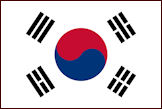
In Seoul (서울) wird die Republik Korea (대한민국) (Südkorea) ausgerufen.
Abb.: Südkorea und Nordkorea
[Bildquelle: CIA. -- Public domain]
1948-08-21
Es erscheint die marxistische Utopie
ศรีอินทรายุธ [Sri-Intharayut = อัศนี พลจันทร - Atsani Phonlajan] <1918 - 1987>: อุตตรกุรุทวีป [Der Kontinent Utarakuru. -- In: การเมือง [Politik]. -- 5, 4 (1948-08-21)
"The treasure-hunters must consist of two kinds of people—one is the laboring diggers who are certainly the proletariat and the other is the map-decipherers and magicians responsible for driving off those treasure-guarding cobras and Grandpa Soem—these are the students. As the diggers must follow the map-decipherers in the map-guided treasure-hunt, so the proletariat must follow the directing and self- sacrificing students in the search for the bliss of Uttarakuru [อุตตรกุรุ]. And if the students are in any danger, the proletariat must try their best to save them. When this is done, heaven on earth will be right before us all."
[a.a.O. -- Übersetzt in: Kasian Tejapira [เกษียร เตชะพีระ] <1957 - >: Commodifying Marxism : the formation of modern Thai radical culture, 1927-1958. -- Kyoto : Kyoto Univ. Pr., 2001. -- 390 S. : Ill. ; 23 cm. -- (Kyoto area studies on Asia ; 3). -- ISBN 1876843985. -- Revision of the author's thesis (doctoral) -- Cornell University, 1992. -- S. 106]
1948-08-23

Amsterdam (Niederlande): Weltkirchenkonferenz: Gründung des Ökumenischen Rats der Kirchen / ÖRK (World Council of Churches / WCC). Die römisch-katholische Kirche macht nicht mit.
1948-08-31

Die Karen National Defence Organization (KNDO) nimmt mit Hilfe der paramilitärischen Union Military Police ohne Gewaltanwendung die Stadt Moulmein (မော်လမြိုင်မြို့) ein und befreit die politischen Gefangenen. U Nu (ဦးနု, 1907 - 1995) verspricht den Karen Autonomie innerhalb der Union of Burma. Daraufhin übergeben die Karen die Stadt wieder an die Regierung
Abb.: Lage von Moulmein (မော်လမြိုင်မြို့)
[Bildquelle: OpenStreetMap. -- Creative Commons Lizenz (Namensnennung, share alike)]
1948-08-31

Peter Goldmark (1906 - 1967) und William Bachmann von Columbia Records stellen die erste Langspielplatte 12-Zoll-(30 cm)-Langspielplatte mit 33 1/3 min−1 und kleinem Mittelloch vor.
Abb.: Erste kommerzielle Langspielplatte
[Bildquelle: Wikipedia. -- fair use]Das Album auf Spotify:
URI: spotify:album:5OuCiNujsYnygLhJBm6MTr
URL: https://open.spotify.com/album/5OuCiNujsYnygLhJBm6MTr
1948-09-03

US-Geheimdienstbericht (CIA): "The break up of the colonial empires and its implications for US security".
Abb.: TitelblattDie Schlussfolgerung:
1948-09-09

In Pjöngjang (평양) wird die Demokratische Volksrepublik Korea (조선민주주의인민공화국) (Nordkorea) ausgerufen. Damit ist Korea in zwei Staaten gespalten.
1948-09-24

Sōichirō Honda (本田 宗一郎, 1906 - 1991) gründet in Tokyo (Japan) die Honda Motor Co., Ltd. (本田技研工業株式会社). Honda wird ab 1964 die führende Motorradmarke und eine wichtige Automarke in Thailand werden.
Abb.: ®Logo
Abb.: Honda-Tuk-Tuk, Kalasin, 2007
[Bildquelle: Marshall Astor. -- http://www.flickr.com/photos/15965815@N00/2491570886. -- Zugriff am 2013-10-05. -- Creative Commons Lizenz (Namensnennung, share alike)]
1948-09-27


Geheimes Policy Statement on Indochina des US State Departement:
"DEPARTMENT OF STATE POLICY STATEMENT ON INDOCHINA, SEPTEMBER 27, 1948 [Extracts] The State Department's first full-length policy statement on Indochina again ruled out military reconquest but also rejected French military withdrawal, on the ground that there would be "chaos and terroristic activities." Since the United States could support neither conquest nor withdrawal, it was left in an essentially passive position of accepting a French policy with which it could not agree.
A. Objectives
The immediate objective of US policy in Indochina is to assist in a solution of the present impasse which will be mutually satisfactory to the French and the Vietnamese peoples, which will result in the termination of the present hostilities, and which will be within the framework of US security.
Our long-term objectives are:
(1) to eliminate so far as possible Communist influence in Indochina and to see installed a self-governing nationalist state which will be friendly to the US and which, commensurate with the capacity of the peoples involved, will be patterned upon our conception of a democratic state as opposed to the totalitarian state which would evolve inevitably from Communist domination; (2) to foster the association of the peoples of Indochina with the western powers, particularly with France with whose customs, language and laws they are familiar, to the end that those peoples will prefer freely to cooperate with the western powers culturally, economically and politically; (3) to raise the standard of living so that the peoples of Indochina will be less receptive to totalitarian influences and will have an incentive to work productively and thus contribute to a better balanced world economy; and (4) to prevent undue Chinese penetration and subsequent influence in Indochina so that the peoples of Indochina will not be hampered in their natural developments by the pressure of an alien people and alien interests.
B. Policy IssuesTo attain our immediate objective, we should continue to press the French to accommodate the basic aspirations of the Vietnamese: (1) unity of Cochinchina, Annam, and Tonkin, (2) complete internal autonomy, and (3) the right to choose freely regarding participation in the French Union. We have recognized French sovereignty over Indochina but have maintained that such recognition does not imply any commitment on our part to assist France to exert its authority over the Indochinese peoples. Since V J day, the majority people of the area, the Vietnamese, have stubbornly resisted the reestablishment of French authority, a struggle in which we have tried to maintain insofar as possible a position of non-support of either party.
While the nationalist movement in Vietnam (Cochinchina, Annam, and Tonkin) is strong, and though the great majority of the Vietnamese are not fundamentally Communist, the most active element in the resistance of the local peoples to the French has been a Communist group headed by Ho Chi Minh [Hồ Chí Minh, 1890 - 1969]. This group has successfully extended its influence to include practically all armed forces now fighting the French, thus in effect capturing control of the nationalist movement.
The French on two occasions during 1946 attempted to resolve the problem by negotiation with the government established and dominated by Ho Chi Minh. The general agreements reached were not, however, successfully implemented and widescale fighting subsequently broke out. Since early in 1947, the French have employed about 115,000 troops in Indochina, with little result, since the countryside except in Laos and Cambodia remains under the firm control of the Ho Chi Minh government. A series of French-established puppet governments have tended to enhance the prestige of Ho's government and to call into question, on the part of the Vietnamese, the sincerity of French intentions to accord an independent status to Vietnam.
C. PoliticalWe have regarded these hostilities in a colonial area as detrimental not only to our own long-term interests which require as a minimum a stable Southeast Asia but also detrimental to the interest of France, since the hatred engendered by continuing hostilities may render impossible peaceful collaboration and cooperation of the French and the Vietnamese peoples. This hatred of the Vietnamese people toward the French is keeping alive anti-western feeling among oriental peoples, to the advantage of the USSR and the detriment of the US.
We have not urged the French to negotiate with Ho Chi Minh, even though he probably is now supported by a considerable majority of the Vietnamese people, because of his record as a Communist and the Communist background of many of the influential figures in and about his government.
Postwar French governments have never understood, or have chosen to underestimate, the strength of the nationalist movement with which they must deal in Indochina. It remains possible that the nationalist movement can be subverted from Communist control but this will require granting to a non-Communist group of nationalists at least the same concessions demanded by Ho Chi Minh. The failure of French governments to deal successfully with the Indochinese question has been due, in large measure, to the overwhelming internal issues facing France and the French Union, and to foreign policy considerations in Europe. These factors have combined with the slim parliamentary majorities of postwar governments in France to militate against the bold moves necessary to divert allegiance of the Vietnamese nationalists to non-Communist leadership.
In accord with our policy of regarding with favor the efforts of dependent peoples to attain their legitimate political aspirations, we have been anxious to see the French accord to the Vietnamese the largest possible degree of political and economic independence consistent with legitimate French interests. We have therefore declined to permit the export to the French in Indochina of arms and munitions for the prosecution of the war against the Vietnamese. This policy has been limited in its effect as we have allowed the free export of arms to France, such exports thereby being available for re-shipment to Indochina or for releasing stocks from reserves to be forwarded to Indochina.
D. Policy EvaluationThe objectives of US policy towards Indochina have not been realized. Three years after the termination of war a friendly ally, France, is fighting a desperate and apparently losing struggle in Indochina. The economic drain of this warfare on French recovery, while difficult to estimate, is unquestionably large. The Commu4ist control in the nationalist movement has been increased during this period. US influence in Indochina and Southeast Asia has suffered as a result.
The objectives of US policy can only be attained by such French action as will satisfy the nationalist aspirations of the peoples of Indochina. We have repeatedly pointed out to the French the desirability of their giving such satisfaction and thus terminating the present open conflict. Our greatest difficulty in talking with the French and in stressing what should and what should not be done has been our inability to suggest any practicable solution of the Indochina problem, as we are all too well aware of the unpleasant fact that Communist Ho Chi Minh is the strongest and perhaps the ablest figure in Indochina and that any suggested solution which excluded him is an expedient of uncertain outcome. We are naturally hesitant to press the French too strongly or to become deeply involved so long as we are not in a position to suggest a solution or until we are prepared to accept the onus of intervention. The above considerations are further complicated by the fact that we have an immediate interest in maintaining in power a friendly French Government, to assist in the furtherance of our aims in Europe. This immediate and vital interest has in consequence taken precedence over active steps looking toward the realization of our objectives in Indochina.
We are prepared, however, to support the French in every way possible in the establishment of a truly nationalist government in Indochina which, by giving satisfaction to the aspirations of the peoples of Indochina, will serve as a rallying point for the nationalists and will weaken the Communist elements. By such support and by active participation in a peaceful and constructive solution in Indochina we stand to regain influence and prestige.
Some solution must be found which will strike a balance between the aspirations of the peoples of Indochina and the interests of the French. Solution by French military reconquest of Indochina is not desirable. Neither would the complete withdrawal of the French from Indochina effect a solution. The first alternative would delay indefinitely the attainment of our objectives, as we would share inevitably in the hatred engendered by an attempted military reconquest and the denial of aspirations for self-government. The second solution would be equally unfortunate as in all likelihood Indochina would then be taken over by the militant Communist group. At best, there might follow a transition period, marked by chaos and terroristic activities, creating a political vacuum into which the Chinese inevitably would be drawn or would push. The absence of stabilization in China will continue to have an important influence upon the objective of a permanent and peaceable solution in Indochina.
We have not been particularly successful in our information and education program in orienting the Vietnamese toward the western democracies and the US. The program has been hampered by the failure of the French to understand that such informational activities as we conduct in Indochina a~-e not inimical to their own long-term interests and by administrative and financial considerations which have prevented the development to the maximum extent of contacts with the Vietnamese. An increased effort should be made to explain democratic institutions, especially American institutions and American policy, to the Indochinese by direct personal contact, by the distribution of information about the US, and the encouraging of educational exchange."
[Quelle: http://vietnamwar.lib.umb.edu/origins/docs/State_Dept.html. -- Zugriff am 2015-08-10]
1948-09-28

Beginn des Prozesses gegen die angeblichen Mörder König Ananda Mahidol's. Angeklagt sind:
- Chaleo Patoomros, Privatsekretär des Verstorbenen
- Chit Singhaseni, Kammerdiener
- Butr Pathamasarin, Kammerdiener
Den Dreien wird vorgeworfen Kenntnis einer Verschwörung zur Ermordung des Königs gehabt und dies nicht gemeldet zu haben. Die beiden Kammerdiener werden außerdem beschuldigt, mit den ungenannten, angeblichen Mördern zusammengearbeitet zu haben.
Konteradmiral Sorayudh Seni sagt vor Gericht aus, dass er die Mordtheorie für absurd hält und dass Pridi nichts mit dem Tod des Königs zu tun habe.
1948-09-29

Siam wird Mitglied der Weltbank und des Internationalen Währungsfonds.
1948-10-01

Putschversuch "Army General Staff Plot" (กบฏเสนาธิการ / กบฏ 1 ตุลาคม)
"The Army General Staff Plot (กบฏเสนาธิการ / กบฏ 1 ตุลาคม) was a failed 1948 attempt to overthrow the Thai government of Field Marshal Plaek Phibunsongkhram. The plotters were members of the Army General Staff, among whom were Lieutenant-General Chit Mansin Sinatyotharak, Pridi's former supreme commander, and Major-General Net Khemayothin (พล.ต. เนตร เขมะโยธิน), a close associate of Phibun during the war and later a prominent Seri Thai member. They objected to the army's increasingly corrupt and inefficient leadership, and hoped to reorganise and professionalise the military. Their plan called for the arrest of Phibun, top government officials, and leading army officers during a birthday party for Sarit Thanarat (จอมพลสฤษดิ์ ธนะรัชต์) scheduled on October 1, 1948.
Although the plotters enjoyed widespread support within the General Staff, the Coup Group which had re-installed Phibun received advance notice of their plans. On September 21 General Phin Chunhawan (ผิน ชุณหะวัณ, 1891–1973) recommended that the Ministry of Defence and other ministries carry out a purge of government officials. His suggestion was approved by the cabinet, and on October 1 the arrests of the coup plotters began. Before the week was over, more than fifty army and reservist and several prominent supporters of Pridi were arrested."
[Quelle: http://en.wikipedia.org/wiki/Army_General_Staff_Plot. -- Zugriff am 2012-06-06]
1948-10-01 - 1951-10-06

Sir Henry Lovell Goldsworthy Gurney (1898 – 1951) ist British High Commissioner in Malaya
Abb.: Sir Henry Lovell Goldsworthy Gurney
[Bildquelle: Wikimedia. -- Public domain]
1948-10-04
"Mr. X." ist der erfolgreichste der sechs im Auftrag der Stadtregierung tätigen Hunde-Töter. Diese fangen und töten für einen Tageslohn von 10 Baht in Bangkok streunende Hunde. 1948 töten sie über 3000 kranke Streuner. Die Hunde-Töter sind für die buddhistischen Thais ein Gräuel.
Abb.: Typischer Streuner, Mae Sai - แม่สาย, Chiang Rai
[Bildquelle: garycycles2. -- http://www.flickr.com/photos/garycycles2/2618626056/. -- Zugriff am 2011-10-09. -- Creative Commons Lizenz (Namensnennung)]
1948-10-04


Der König und sein Schwager, Colonel Aram Ratanakul Serireongrit (อร่าม รัตนกุล เสรีเริงฤทธิ์, 1920 - 1982), wollen von Pully aus in Genf ein Jazzkonzert besuchen. Sie fahren mit des Königs Fiat Topolino. König Bhumibol fährt auf der Kurve von Préverenges nach Morges (Schweiz) auf einen Lastwagen ohne Rücklicht auf. Er wird schwer verletzt und in einer Privatklinik in Lausanne behandelt.
Abb.: Lage von Morges
[Bildquelle: OpenStreetMap. -- Creative Commons Lizenz (Namensnennung, share alike)]
Abb.: Lage von Pully, Morges, Préverenges und Genf
[Bildquelle: OpenStreetMap. -- Creative Commons Lizenz (Namensnennung, share alike)]
Nach 1948-10-04


Um näher bei König Bhumibol sein zu können, geht Sirikit Kitiyakara (สิริกิติ์ กิติยากร, 1932 - ), die künftige Königin, ans Institute Riante-Rive in Lausanne
1948-10-17
Die kommunistische Tageszeitung Mahachon (มหาชน, 'Die Massen') veröffentlicht den Artikel:"Die Regierung ist die Ursache des Niedergangs."
Deswegen wird der Eigner der Zeitung, Wiroj Amphai (วิโรจน์ อำไพ), von der Polizei verhört wegen "Veröffentlichung eines Artikels, der zur Kritik an der Regierung aufruft."
1948-11 - 1954-02
Die Regierung gründet eine Vielzahl anti-kommunistischer Organisationen und Institutionen:
"Overseeing all these and other aspects of the government’s anticommunist crusade was a series of organs established by Prime Minister Phibun specifically for the purpose—
- Khana Kammakan Raksakan Klang [คณะกรรมการรักษาการกลาง] (Central Supervisory Commission, November 1948);
- Khana Kammakan Obrom Kharajkan Lae Prachachon [คณะกรรมการอบรมข้าราชการและประชาชน] (Committee for the Instruction of Officials and the People);
- Krom Pramual Rajkan Phaendin [กรมประมวลราชการแผ่นดิน] (National Intelligence Agency);
- Khana Kammakan Phijjarana Hathang Lae Damnoen Kanprabpram Nangseuphim Thi Pen Fai Khommunit [คณะกรรมการพิจารณาหาทางและดำเนินการปราบปรามหนังสือพิมพ์ที่เป็นฝ่ายคอมมิวนิสต์] (Investigative and Executive Committee for the Suppression of the Communist Press, October 1951);
- Khana Kammakan Phijjarana Rang Kodmai Waduai Kankratham Thi Pen Patipak To Prathet Thai [คณะกรรมการพิจารณาร่างกฎหมายว่าด้วยการกระทำที่เป็นปฏิปักษ์ต่อประเทศไทย] (Un-Thai Activities Act Drafting Committee, October 1952);
- Kong Tamruaj Raksa Chaidaen [กองตำรวจรักษาการณ์ชายแดน] (Border Guard Police Force. 1954); and
- Kong Asa Raksa Dindaen [กองอาสารักษาดินแดน] (Territorial Guard Volunteer Force, February 1954)"
[Quelle: Kasian Tejapira [เกษียร เตชะพีระ] <1957 - >: Commodifying Marxism : the formation of modern Thai radical culture, 1927-1958. -- Kyoto : Kyoto Univ. Pr., 2001. -- 390 S. : Ill. ; 23 cm. -- (Kyoto area studies on Asia ; 3). -- ISBN 1876843985. -- Revision of the author's thesis (doctoral) -- Cornell University, 1992. -- S. 157f.]
1948-12-06

Associated Press meldet, dass Thailand von Großbritannien Waffen erhalten hat sowie ein Bündnis, um einen gemeinsamen Kampf des malaiisch-sprachigen Südens Thailands und der Malaien Malayas zu verhindern.
Abb.: Malaiisch-Thailand
[Bildquelle: Wikipedia. -- Public domain]
1948-12-10
Die 16jährige Ladda Suvarnsubha (ลัดดา สุวรรณสุภา) aus der südthailändischen Provinz Pattani (ปัตตานี) wird Miss Siam 1948.
1948-12-10
Der Schweizer Chemiker Paul Müller (1899 - 1965, Firma Geigy) erhält den Nobelpreis für Medizin für die Entdeckung der insektiziden Wirkung von DDT. Dieses spielt eine große Rolle bei der Bekämpfung der Malaria.
Abb.: Paul Müller
[Bildquelle: Wikipedia. -- Public domain]
1948-12-09
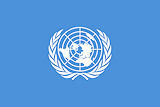
Die Vollversammlung der UNO verabschiedet die Allgemeine Erklärung der Menschenrechte (Univeral Declaration of Human Rights, ปฏิญญาสากลว่าด้วยสิทธิมนุษยชน). Auch Thailand stimmt dafür.
Abb.: Plakat der Konrad-Adenauer-Stiftung zu den Menschenrechten
[Bildquelle: http://www.learners.in.th/blogs/posts/509954. -- Zugriff am 2013-05-19. -- Fair use]
ปฏิญญาสากลว่าด้วยเรื่อง สิทธิมนุษยชน
Die Allgemeine Erklärung der Menschenrechte
ข้อ 1
มนุษยทั้งหลายทั้งหลายเกิดมามีอิสระเสรี เท่าเทียมกันทั้งศักดิ์ศรีและสิทธิ ทุกคนได้รับการประสิทธิ์ประสาทเหตุผลและมโนธรรม และควรปฎิบัติต่อกันอย่างฉันพี่น้อง
Artikel 1
Alle Menschen sind frei und gleich an Würde und Rechten geboren. Sie sind mit Vernunft und Gewissen begabt und sollen einander im Geist der Brüderlichkeit begegnen.ข้อ 2
บุคคลชอบที่จะมีสิทธิและเสรีภาพตามที่ระบุไว้ในปฏิญญานี้ ทั้งนี้โดยไม่มีการจำแนกความแตกต่างในเ รื่องใดๆ เช่น เชื้อชาติ สีผิว เพศ ภาษา ศาสนา ความเห็นทางการเมือง หรือทางอื่นใด ชาติหรือสังคมอันเป็นที่มาเดิม ทรัพย์สิน กำเนิด หรือสถานะอื่นใด
นอกจากนี้การจำแนกข้อแตกต่าง โดยอาศัยมูลฐานแห่งสถานะทางการเมือง ทางดุลอาณาหรือทางเรื่องระหว่างประเทศของประเทศ หรือดินแดนซึ่งบุคคลสังกัดจะทำมิได้ ทั้งนี้ไม่ว่าดินแดนดังกล่าวจะเป็นเอกราช อยู่ในความพิทักษ์ มิได้ปกครองตนเอง หรืออยู่ภายใต้การจำกัดแห่งอธิปไตยอื่นใดArtikel 2
Jeder hat Anspruch auf die in dieser Erklärung verkündeten Rechte und Freiheiten ohne irgendeinen Unterschied, etwa nach Rasse, Hautfarbe, Geschlecht, Sprache, Religion, politischer oder sonstiger Überzeugung, nationaler oder sozialer Herkunft, Vermögen, Geburt oder sonstigem Stand.Des weiteren darf kein Unterschied gemacht werden auf Grund der politischen, rechtlichen oder internationalen Stellung des Landes oder Gebiets, dem eine Person angehört, gleichgültig ob dieses unabhängig ist, unter Treuhandschaft steht, keine Selbstregierung besitzt oder sonst in seiner Souveränität eingeschränkt ist.
ข้อ 3
บุคคลมีสิทธิในการดำเนินชีวิต ในเสรีธรรมและในความมั่นคงแห่งร่างกาย
Artikel 3
Jeder hat das Recht auf Leben, Freiheit und Sicherheit der Person.ข้อ 4
บุคคลใดจะถูกบังคับให้เป็นทาส หรืออยู่ในภาระจำยอมใดๆมิได้ การเป็นทาสและการค้าทาสจะมีไม้ได้ทุกรูปแบบ
Artikel 4
Niemand darf in Sklaverei oder Leibeigenschaft gehalten werden; Sklaverei und Sklavenhandel sind in allen ihren Formen verboten.ข้อ 5
บุคคลใดจะถูกทรมานหรือได้รับการปฎิบัติ หรือลงทัณฑ์ซึ่งทารุณโหด ไร้มนุษยธรรมหรือเหยียดหยามเกียรติมิได้
Artikel 5
Niemand darf der Folter oder grausamer, unmenschlicher oder erniedrigender Behandlung oder Strafe unterworfen werden.ข้อ 6
ทุกๆคนมีสิทธิที่จะได้รับ การยอมรับว่าเป็นบุคคลในกฎหมาย ไม่ว่า ณ ที่ใดๆ
Artikel 6
Jeder hat das Recht, überall als rechtsfähig anerkannt zu werden.ข้อ 7
ทุกๆคน ต่างเสมอกันในกฎหมายและชอบที่จะได้รับความคุ้มครองตามกฎหมายเท่าเทียมกัน โดยปราศจากการเลือกปฎิบัติใดๆ ทุกคนชอบที่จะได้รับการคุ้มครองอย่างเสมอหน้าจากการเลือกปฎิบัติใดๆ อันเป็นการล่วงละเมิดปฏิญญานี้ และต่อการยุยงส่งเสริมให้เกิดการเลือกปฎิบัติเช่นนั้น
Artikel 7
Alle Menschen sind vor dem Gesetz gleich und haben ohne Unterschied Anspruch auf gleichen Schutz durch das Gesetz. Alle haben Anspruch auf gleichen Schutz gegen jede Diskriminierung, die gegen diese Erklärung verstößt, und gegen jede Aufhetzung zu einer derartigen Diskriminierung.ข้อ 8
บุคคลมีสิทธิที่จะได้รับการเยียวยาอย่างได้ผล โดยศาลแห่งชาติซึ่งมีอำนาจเนื่องจากการกระทำใดๆ อันละเมิดต่อสิทธิขั้นมูลฐาน ซึ่งตนได้รับจากรัฐธรรมนูญ หรือกฎหมาย
Artikel 8
Jeder hat Anspruch auf einen wirksamen Rechtsbehelf bei den zuständigen innerstaatlichen Gerichten gegen Handlungen, durch die seine ihm nach der Verfassung oder nach dem Gesetz zustehenden Grundrechte verletzt werden.ข้อ 9
บุคคลใดจะถูกจับ กักขัง หรือเนรเทศโดยพลการมิได้
Artikel 9
Niemand darf willkürlich festgenommen, in Haft gehalten oder des Landes verwiesen werden.ข้อ 10
บุคคลชอบที่จะเท่าเทียมกันอย่างบริบูรณ์ ในอันที่จะได้รับการพิจารณาอย่างเป็นธรรมและเปิดเผย โดยศาลที่เป็นอิสระและ ไร้อคติ ในการวินิจฉัยชี้ขาดสิทธิและหน้าที่ ตลอดจนข้อที่ตนถูกกล่าวหาใดๆ ทางอาญา
Artikel 10
Jeder hat bei der Feststellung seiner Rechte und Pflichten sowie bei einer gegen ihn erhobenen strafrechtlichen Beschuldigung in voller Gleichheit Anspruch auf ein gerechtes und öffentliches Verfahren vor einem unabhängigen und unparteiischen Gericht.ข้อ 11
บุคคลที่ถูกกล่าวหาด้วยความผิดทางอาญา มีสิทธิ์ที่จะได้รับการสันนิฐานไว้ก่อนว่าบริสุทธิ์ จนกว่าจะจะมีการพิสูจน์ว่า มีความผิดตามกฎหมาย ในการพิจารณาโดยเปิดเผย ณ ที่ซึ่งตนได้รับหลักประกันทั้งหมดที่จำเป็นในการต่อสู้คดี
บุคคลใดจะถูกถือว่ามีความผิดอันมีโทษทางอาญาใดๆ ด้วยเหตุที่ตนได้กระทำหรือละเว้นการกระทำใดๆ ซึ่งกฎหมายของประเทศหรือกฎหมายระหว่างประเทศ ในขณะที่ได้กระทำนั้นมิได้ถูกระบุว่ามีความผิดทางอาญามิได้ และโทษที่จะลงแก่บุคคลนั้นหนักกว่าโทษที่ใช้อยู่ในขณะที่การกระทำความผิดทางอาญานั้นเกิดขึ้นมิได้
Artikel 11
Jeder, der wegen einer strafbaren Handlung beschuldigt wird, hat das Recht, als unschuldig zu gelten, solange seine Schuld nicht in einem öffentlichen Verfahren, in dem er alle für seine Verteidigung notwendigen Garantien gehabt hat, gemäß dem Gesetz nachgewiesen ist.Niemand darf wegen einer Handlung oder Unterlassung verurteilt werden, die zur Zeit ihrer Begehung nach innerstaatlichem oder internationalem Recht nicht strafbar war. Ebenso darf keine schwerere Strafe als die zum Zeitpunkt der Begehung der strafbaren Handlung angedrohte Strafe verhängt werden.
ข้อ 12
การเข้าไปสอดแทรกโดยพลการในกิจส่วนตัว ครอบครัว เคหะสถาน การส่งข่าวสาร ตลอดจนการโจมตีต่อเกียรติยศและ ชื่อเสียงของบุคคลนั้นจะทำมิได้ ทุกคนมีสิทธิ์ที่จะได้รับการคุ้มครองตามกฎหมายจากการสอดแทรก และการโจมตีดังกล่าว
Artikel 12
Niemand darf willkürlichen Eingriffen in sein Privatleben, seine Familie, seine Wohnung und seinen Schriftverkehr oder Beeinträchtigungen seiner Ehre und seines Rufes ausgesetzt werden. Jeder hat Anspruch auf rechtlichen Schutz gegen solche Eingriffe oder Beeinträchtigungen.ข้อ 13
บุคคลมีสิทธิที่จะมีเสรีภาพในการเคลื่อนย้ายและในถิ่นที่อยู่ภายในขอบเขตดินแดนของแต่ละรัฐ
บุคคลมีสิทธิที่จะเดินทางออกนอกประเทศใดๆ รวมทั้งของตนเอง และมีสิทธิที่จะกลับสู่บ้านเกิดเมืองนอน
Artikel 13
Jeder hat das Recht, sich innerhalb eines Staates frei zu bewegen und seinen Aufenthaltsort frei zu wählen.Jeder hat das Recht, jedes Land, einschließlich seines eigenen, zu verlassen und in sein Land zurückzukehren.
ข้อ 14
บุคคลมีสิทธิที่จะแสวงหาและพักพิงในประเทศอื่นๆ เพื่อลี้ภัยจากการถูกกดขี่ข่มเหง
สิทธินี้จะถูกกล่าวอ้างมิได้ในกรณีการฟ้องคดี ซึ่งโดยจากความจริงเกิดจากความผิดที่ไม่ใช่เรื่องทางการเมือง หรือจากการกระทำที่ขัดต่อความมุ่งประสงค์และหลักการของสหประชาชาติ
Artikel 14
Jeder hat das Recht, in anderen Ländern vor Verfolgung Asyl zu suchen und zu genießen.Dieses Recht kann nicht in Anspruch genommen werden im Falle einer Strafverfolgung, die tatsächlich auf Grund von Verbrechen nichtpolitischer Art oder auf Grund von Handlungen erfolgt, die gegen die Ziele und Grundsätze der Vereinten Nationen verstoßen.
ข้อ 15
บุคลลมีสิทธิในการถือสัญชาต
การถอนสัญชาติโดยพลการ หรือปฎิเสธสิทธิที่จะเปลี่ยนสัญชาติ ของบุคคลใดนั้น จะกระทำมิได้
Artikel 15
Jeder hat das Recht auf eine Staatsangehörigkeit.Niemandem darf seine Staatsangehörigkeit willkürlich entzogen noch das Recht versagt werden, seine Staatsangehörigkeit zu wechseln.
ข้อ 16
ชายหญิงเมื่อเจริญวัยบริบรูณ์แล้ว มีสิทธิที่จะสมรสและสร้างครอบครัว โดยไม่มีการจำกัดใดๆเนื่องจาก เชื้อชาติ สัญชาติ หรือศาสนา บุคคล ชอบที่จะมีสิทธิเท่าเทียมกันในเรื่องการสมรส ในระหว่างการสมรส และในการขาดจากการสมรส
การสมรสจะกระทำได้โดยการยินยอมอย่างเสร ี และเต็มใจ ของคู่ที่ตั้งใจจะกระทำการสมรส
ครอบครัวคือ กลุ่มซึ่งเป็นหน่วยทางธรรมชาติและพื้นฐานทางสังคม และชอบที่จะได้รับความคุ้มครองโดยสังคมและรัฐ
Artikel 16
Heiratsfähige Frauen und Männer haben ohne Beschränkung auf Grund der Rasse, der Staatsangehörigkeit oder der Religion das Recht zu heiraten und eine Familie zu gründen. Sie haben bei der Eheschließung, während der Ehe und bei deren Auflösung gleiche Rechte.Eine Ehe darf nur bei freier und uneingeschränkter Willenseinigung der künftigen Ehegatten geschlossen werden.
Die Familie ist die natürliche Grundeinheit der Gesellschaft und hat Anspruch auf Schutz durch Gesellschaft und Staat.ข้อ 17
บุคคลมีสิทธิในการเป็นเจ้าของทรัพย์สินโดยลำพังตนเอง และโดยการร่วมกับผู้อื่น
การยึดเอาทรัพย์สินของบุคคลใดไปเสียโดยพลการจะกระทำมิได้
Artikel 17
Jeder hat das Recht, sowohl allein als auch in Gemeinschaft mit anderen Eigentum innezuhaben.Niemand darf willkürlich seines Eigentums beraubt werden.
ข้อ 18
บุคคลมีเสรีภาพทางความคิด มโนธรรม และศาสนา สิทธินี้รวมถึงเสรีภาพที่จะเปลี่ยนศาสนา หรือความเชื่อ และเสรีภาพที่จะแสดงให้ศาสนาหรือความเชื่อประจักษ์ในรูปแบบการสั่งสอน การปฎิบัติกิจ การเคารพสักการะบูชา สวดมนต์ และพิธีกรรม ไม่ว่าจะโดยลำพังตนเอง หรือร่วมกับผู้อื่นในประชาคม ในที่สาธารณะหรือในที่ส่วนตัว
Artikel 18
Jeder hat das Recht auf Gedanken-, Gewissens- und Religionsfreiheit; dieses Recht schließt die Freiheit ein, seine Religion oder Überzeugung zu wechseln, sowie die Freiheit, seine Religion oder Weltanschauung allein oder in Gemeinschaft mit anderen, öffentlich oder privat durch Lehre, Ausübung, Gottesdienst und Kulthandlungen zu bekennen.ข้อ 19
บุคคลมีสิทธิและเสรีภาพในความเห็น และการแสดงออก สิทธินี้รวมถึงเสรีภาพที่จะยึดมั่น ในความคิดเห็นโดยปราศจากการสอดแทรก และที่จะแสวงหารับ ตลอดจนการแจ้งข่าว รวมทั้งความคิดเห็นโดยผ่านสื่อใดๆ โดยมิต้องคำนึงถึงเขตแดน
Artikel 19
Jeder hat das Recht auf Meinungsfreiheit und freie Meinungsäußerung; dieses Recht schließt die Freiheit ein, Meinungen ungehindert anzuhängen sowie über Medien jeder Art und ohne Rücksicht auf Grenzen Informationen und Gedankengut zu suchen, zu empfangen und zu verbreiten.ข้อ 20
บุคคลมีสิทธิและเสรีภาพในการชุมนุม และสมาคมโดยสงบ
การบังคับให้บุคคลเป็นเข้าเป็นสมาชิกของสมาคมจะกระทำมิได้
Artikel 20
Alle Menschen haben das Recht, sich friedlich zu versammeln und zu Vereinigungen zusammenzuschließen.Niemand darf gezwungen werden, einer Vereinigung anzugehören.
ข้อ 21
บุคคลมีสิทธิที่จะเข้าร่วมในรัฐบาลของตนไม่ว่าจะโดยหรือผู้แทนที่ผ่านการเลือกอย่างเสรี
บุคคลมีสิทธิที่จะเข้าถึงการบริการสาธารณะในประเทศของตน
เจตจำนงของประชาชน จะเป็นฐานอำนาจของรัฐบาล เจตจำนงนี้จะแสดงออกโดยการเลือกตั้ง เป็นครั้งเป็นคราวอย่างแท้จริง โดยการให้สิทธิออกเสียงอย่างทั่วถึงและเท่าเทียมและโดยการลงคะแนนลับ หรือโดยวิธีการลงคะแนนอย่างเสรี
Artikel 21
Jeder hat das Recht, an der Gestaltung der öffentlichen Angelegenheiten seines Landes unmittelbar oder durch frei gewählte Vertreter mitzuwirken.Jeder hat das Recht auf gleichen Zugang zu öffentlichen Ämtern in seinem Lande.
Der Wille des Volkes bildet die Grundlage für die Autorität der öffentlichen Gewalt; dieser Wille muß durch regelmäßige, unverfälschte, allgemeine und gleiche Wahlen mit geheimer Stimmabgabe oder in einem gleichwertigen freien Wahlverfahren zum Ausdruck kommen.ข้อ 22
ในฐานะสมาชิกของสังคม ด้วยความเพียรพยายามของชาติตลอดจนความร่วมมือระหว่างประเทศ และโดยสอดคล้องกับการจัดระเบียบและทรัพยากรของแต่ละรัฐบุคคลมีสิทธิในความมั่นคงทางสังคม และชอบที่จะได้รับผลแห่งสิทธิทางเศรษฐกิจ สังคมและวัฒนธรรม ซึ่งจำเป็นต่อศักดิ์ศรีและการพัฒนาบุคลิกภาพ อย่างเสรีของตน
Artikel 22
Jeder hat als Mitglied der Gesellschaft das Recht auf soziale Sicherheit und Anspruch darauf, durch innerstaatliche Maßnahmen und internationale Zusammenarbeit sowie unter Berücksichtigung der Organisation und der Mittel jedes Staates in den Genuß der wirtschaftlichen, sozialen und kulturellen Rechte zu gelangen, die für seine Würde und die freie Entwicklung seiner Persönlichkeit unentbehrlich sind.ข้อ 23
บุคคลมีสิทธิที่จะทำงาน และเลือกงานอย่างเสรี และมีสภาวะการทำงานที่ยุติธรรมและพอใจ ที่จะได้รับการคุ้มครองจากการว่างงาน
บุคคลมีสิทธิที่จะรับค่าตอบแทนเท่ากัน สำหรับการทำงานที่เท่ากัน โดยไม่มีการเลือกปฎิบัติใดๆ
บุคคลที่ทำงานมีสิทธิในรายได้ซึ่งยุติธรรม และเอื้อประโยชน์เฟื่อเป็นประกันสำหรับตนเอง และครอบครัวให้การดำรงค์มีด่าควรแก่สักดิ์ศรี ของมนุษย์ และถ้าจำเป็นก็ชอบที่จะได้รับการคุ้มครองทางสังคมอื่นๆ เพิ่มเติม
บุคคลมีสิทธิที่จะก่อตั้งและเข้าร่วมสหภาพแรงงาน เพื่อคุ้มครองผลประดยชน์ของตน
Artikel 23
Jeder hat das Recht auf Arbeit, auf freie Berufswahl, auf gerechte und befriedigende Arbeitsbedingungen sowie auf Schutz vor Arbeitslosigkeit.Jeder, ohne Unterschied, hat das Recht auf gleichen Lohn für gleiche Arbeit.
Jeder, der arbeitet, hat das Recht auf gerechte und befriedigende Entlohnung, die ihm und seiner Familie eine der menschlichen Würde entsprechende Existenz sichert, gegebenenfalls ergänzt durch andere soziale Schutzmaßnahmen.Jeder hat das Recht, zum Schutz seiner Interessen Gewerkschaften zu bilden und solchen beizutreten.
ข้อ 24
บุคคลมีสิทธิในการพักผ่อนและเวลาว่าง รวมทั้งการจำกัดเวลาทำงานที่ชอบด้วยเหตุผล และมีวันหยุดเป็นครั้งคราวที่ได้รับค่าตอบแทน
Artikel 24
Jeder hat das Recht auf Erholung und Freizeit und insbesondere auf eine vernünftige Begrenzung der Arbeitszeit und regelmäßigen bezahlten Urlaub.ข้อ 25
บุคคลมีสิทธิในมาตราฐานการครองชีพที่เพียงพอสำหรับสุขภาพและความเป็นอยู่ที่ดีสำหรับตนเองครอบครัว รวมทั้งอาหาร เสื้อผ้า ที่อยู่อาศัย การรักษาพยาบาลและบริการทางสังคมที่จำเป็น และสิทธิในความมั่นคงในกรณีย์ว่างงาน เจ็บป่วย ทุพพลภาพ เป็นหม้าย วัยชรา หรือการขาดปัจจัยในการเลี้ยงชีพ อื่นใดในพฤติการณ์อันเกิดจากที่ตนควบคุมได้
มารดาและบุตรชอบที่จะได้รับการดูและความช่วยเหลือเป็นพิเศษ เด็กทั้งหลายไม่ว่าจะเป็นบุตรในหรือนอกสมรส ย่อมได้รับการคุ้มครอง ทางสังคมเช่นเดียวกัน
Artikel 25
Jeder hat das Recht auf einen Lebensstandard, der seine und seiner Familie Gesundheit und Wohl gewährleistet, einschließlich Nahrung, Kleidung, Wohnung, ärztliche Versorgung und notwendige soziale Leistungen gewährleistet sowie das Recht auf Sicherheit im Falle von Arbeitslosigkeit, Krankheit, Invalidität oder Verwitwung, im Alter sowie bei anderweitigem Verlust seiner Unterhaltsmittel durch unverschuldete Umstände.Mütter und Kinder haben Anspruch auf besondere Fürsorge und Unterstützung. Alle Kinder, eheliche wie außereheliche, genießen den gleichen sozialen Schutz.
ข้อ 26
บุคคลมีสิทธิในการศึกษา การศึกษาจะเป็นสิ่งที่ให้ประโยชน์โดยไม่คิดมูลค่า อย่างน้อยที่สุดในขั้นประถมศึกษษ และขั้นพื้นฐาน ชั้นประถมศึกษาให้เป็นการศึกษาภาคบังคับ ขั้นเทคนิคและประกอบอาชีพเป็นการศึกษาที่ต้องจัดให้มีโดยทั่วๆไป ขั้นสูงสุดเป็นขั้นที่จะเปิดให้ทุกคนเท่ากันตามความสามารถ
การศึกษาจะมุ่งไปทางการพัฒนาบุคลิกภาพของมนุษย์อย่างเต็มที่ เพื่อเสริมพลังการเคารพสิทธิมนุษยชน และเสรีภาพขั้นพื้นฐานให้แข็งแกร่ง และมุ่งเสริมความเข้าใจ ขันติและมิตรภาพระหว่างประชาชาติ กลุ่มเชื้อชาติและศาสนา และจะมุ่งขยายกิจกรรมของสหประชาชาติเพื่อธำรงสันติภาพ
ผู้ปกครองมีสิทธิก่อนผู้อื่นที่จะเลือกชนิดของการศึกษา สำหรับบุตรหลานของตน
Artikel 26
Jeder hat das Recht auf Bildung. Die Bildung ist unentgeltlich, zum mindesten der Grundschulunterricht und die grundlegende Bildung. Der Grundschulunterricht ist obligatorisch. Fach- und Berufsschulunterricht müssen allgemein verfügbar gemacht werden, und der Hochschulunterricht muß allen gleichermaßen entsprechend ihren Fähigkeiten offenstehen.Die Bildung muß auf die volle Entfaltung der menschlichen Persönlichkeit und auf die Stärkung der Achtung vor den Menschenrechten und Grundfreiheiten gerichtet sein. Sie muß zu Verständnis, Toleranz und Freundschaft zwischen allen Nationen und allen rassischen oder religiösen Gruppen beitragen und der Tätigkeit der Vereinten Nationen für die Wahrung des Friedens förderlich sein.
Die Eltern haben ein vorrangiges Recht, die Art der Bildung zu wählen, die ihren Kindern zuteil werden soll.ข้อ 27
บุคคลมีสิทธิที่จะเข้าร่วมการใช้ชีวิตทางวัฒนธรรมในประชาคมออย่างเสรี ที่จะพึงพอใจในศิลปะและมีส่วนในความคืบหน้า และผลประโยชน์ทางวิทยาศาสตร์
บุคคลมีสิทธิในการได้รับการคุ้มครองประโยชน์ทางด้านศีลธรรม และทางวัตถุอันเป็นผลได้จากการประดิษฐ์ทางวิทยาศาสตร์ วรรณกรรม และศิลปธที่ตนเป็นเจ้าของ
Artikel 27
Jeder hat das Recht, am kulturellen Leben der Gemeinschaft frei teilzunehmen, sich an den Künsten zu erfreuen und am wissenschaftlichen Fortschritt und dessen Errungenschaften teilzuhaben.Jeder hat das Recht auf Schutz der geistigen und materiellen Interessen, die ihm als Urheber von Werken der Wissenschaft, Literatur oder Kunst erwachsen.
ข้อ 28
บุคคลชอบที่จะได้รับประโยชน์จากระเบียบสังคมและระหว่างประเทศ อันจะอำนวยให้การใช้สิทธิและเสรีภาพบรรดาที่ได้ระบุไว้ใน ปฏิญญานี้ทำได้อย่างเต็มที่
Artikel 28
Jeder hat Anspruch auf eine soziale und internationale Ordnung, in der die in dieser Erklärung verkündeten Rechte und Freiheiten voll verwirklicht werden können.ข้อ 29
บุคคลมีหน้าที่ต่อประชาคมอันเป็นที่เดียวซึ่งบุคลิกภาพของตนจะพัฒนาได้อย่างเสรีเต็มความสามารถ
ในการใช้สิทธิและเสรีภาพบุคคลต้องอยู่ภาพใต้เพียงเช่นที่จำกัดโดยกฎหมายเฉพาะเพื่อความมุ่งประสงค์ ใหเได้มาซึ่งการยอมรับ และเคารพในสิทธิและเสรีภาพของผู้อื่น เพื่อให้สอดคล้องกับข้อกำหนดขอลศีลธรรม ความสงบเรียบร้อยของประชาชน และสวัสดิการโดยทั่วๆไป ในสังคมประชาธิปไตย
สิทธิและเสรีภาพเหล่านี้ มิว่าด้วยกรณีย์ใด จะใช้ขัดกับความมุ่งประสงค์และหลักการ ของสหประชาชาติไม่ได้
Artikel 29
Jeder hat Pflichten gegenüber der Gemeinschaft, in der allein die freie und volle Entfaltung seiner Persönlichkeit möglich ist.Jeder ist bei der Ausübung seiner Rechte und Freiheiten nur den Beschränkungen unterworfen, die das Gesetz ausschließlich zu dem Zweck vorsieht, die Anerkennung und Achtung der Rechte und Freiheiten anderer zu sichern und den gerechten Anforderungen der Moral, der öffentlichen Ordnung und des allgemeinen Wohles in einer demokratischen Gesellschaft zu genügen.
Diese Rechte und Freiheiten dürfen in keinem Fall im Widerspruch zu den Zielen und Grundsätzen der Vereinten Nationen ausgeübt werden.ข้อ 30
ข้อความต่างๆตามปฏิญญานี้ ไม่เปิดช่องที่จะแปลความได้ว่า ให้สิทธิใดๆแก่รัฐ กลุ่มชนหรือบุคคลใดๆ ที่จะประกอบกิจกรรม หรือกระทำการใดๆ อันมุ่งต่อการทำลายสิทธิและเสรีภาพใดๆ ที่ได้ระบุไว้ในบทบัญญัติฉบับนี้.
Artikel 30
Keine Bestimmung dieser Erklärung darf dahin ausgelegt werden, daß sie für einen Staat, eine Gruppe oder eine Person irgendein Recht begründet, eine Tätigkeit auszuüben oder eine Handlung zu begehen, welche die Beseitigung der in dieser Erklärung verkündeten Rechte und Freiheiten zum Ziel hat.
1948-12-24

Birmanische Polizisten überfallen die Weihnachtsgottesdienste in 8 Karen-Dörfern und ermorden über 80 Männer, Frauen und Kinder.
ausführlich: http://www.payer.de/thailandchronik/ressourcen.htm
Zu Chronik 1949